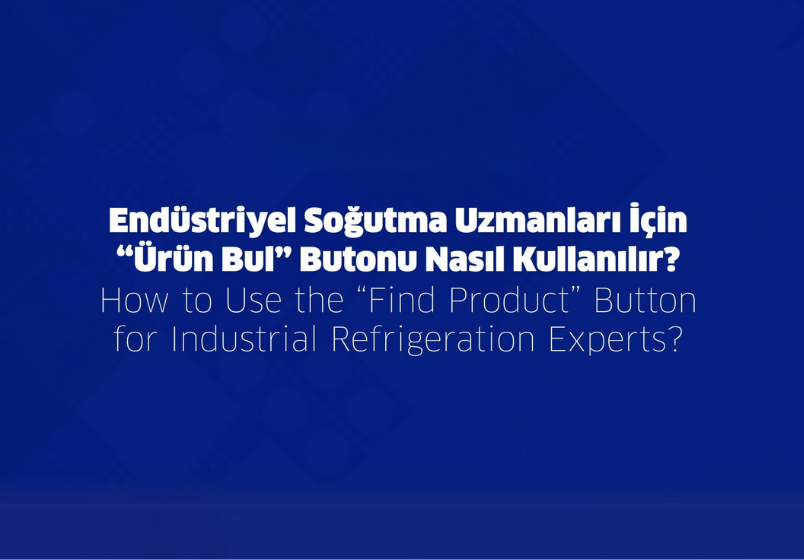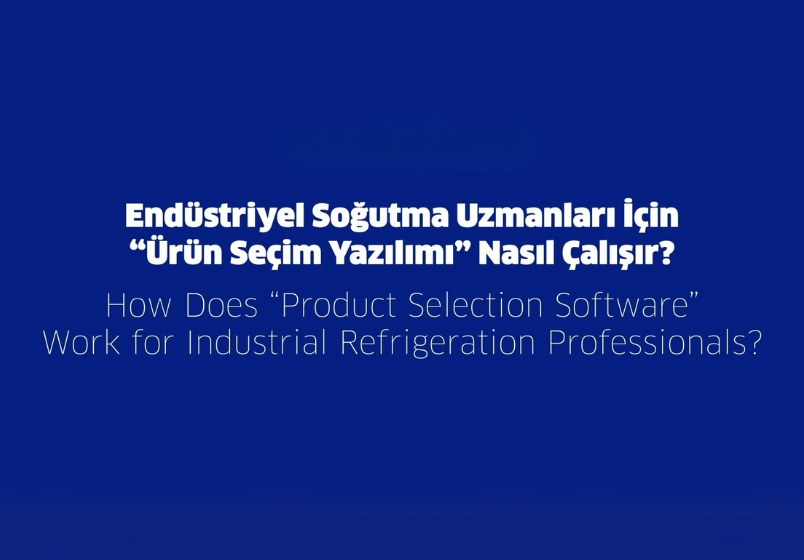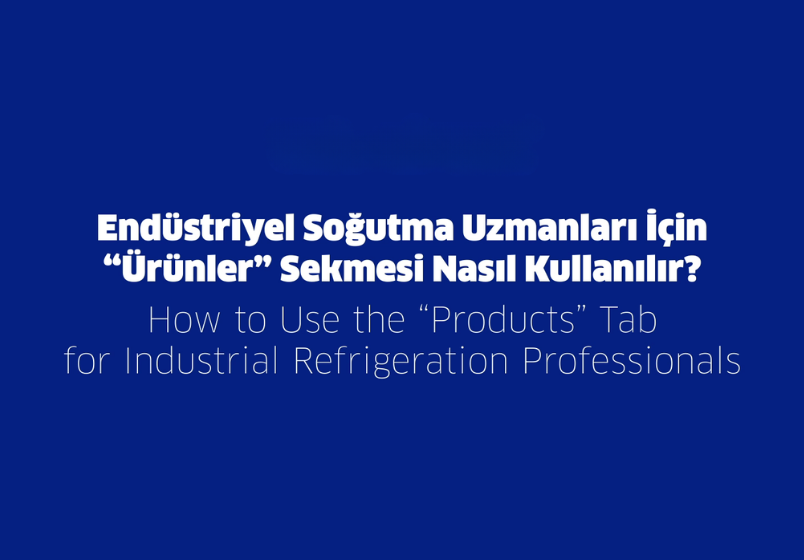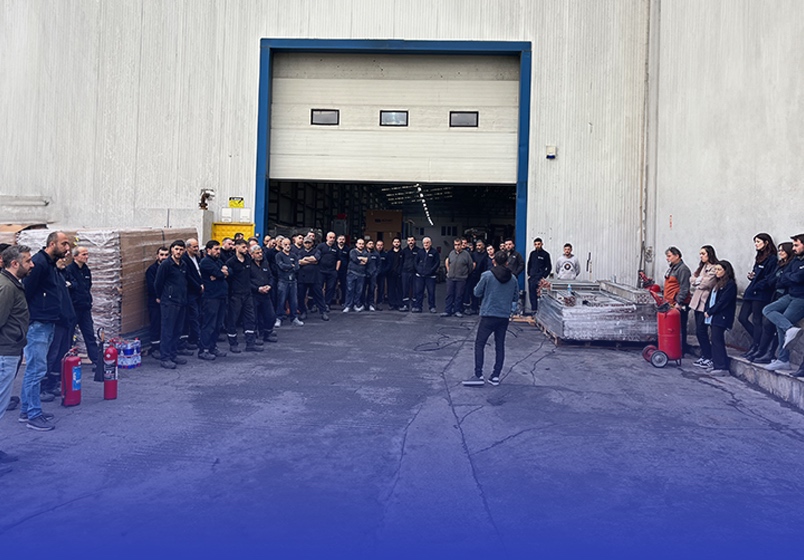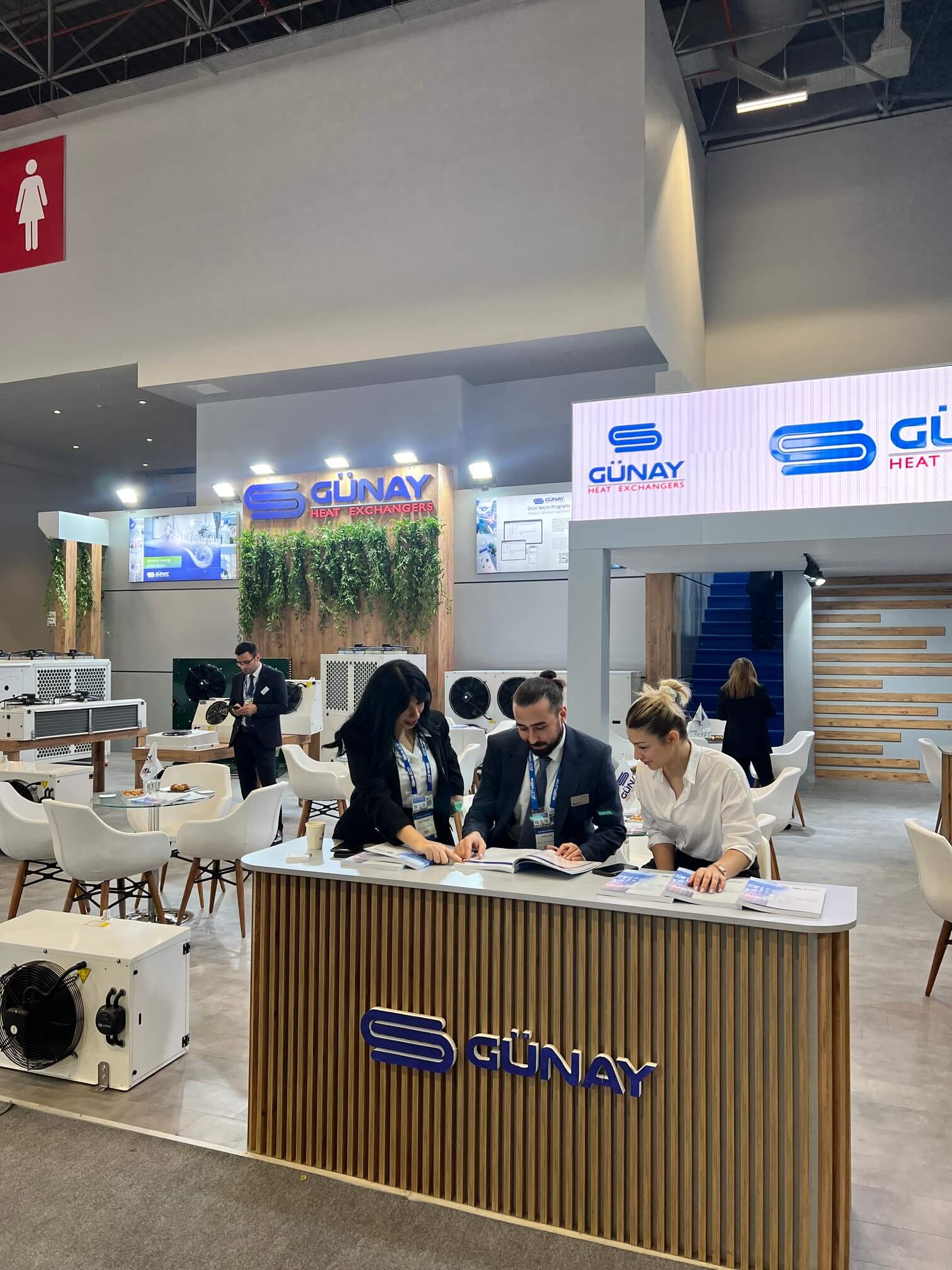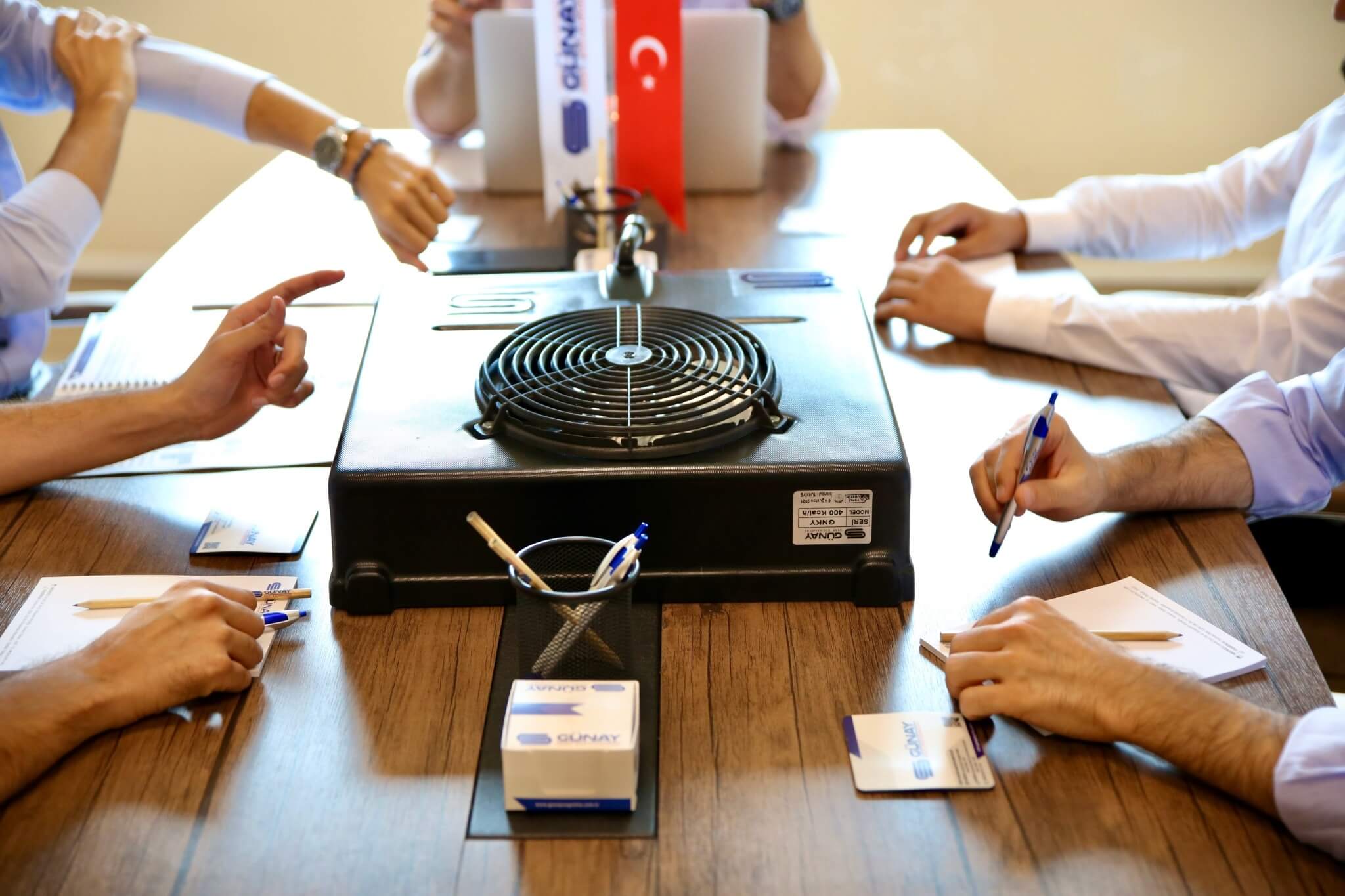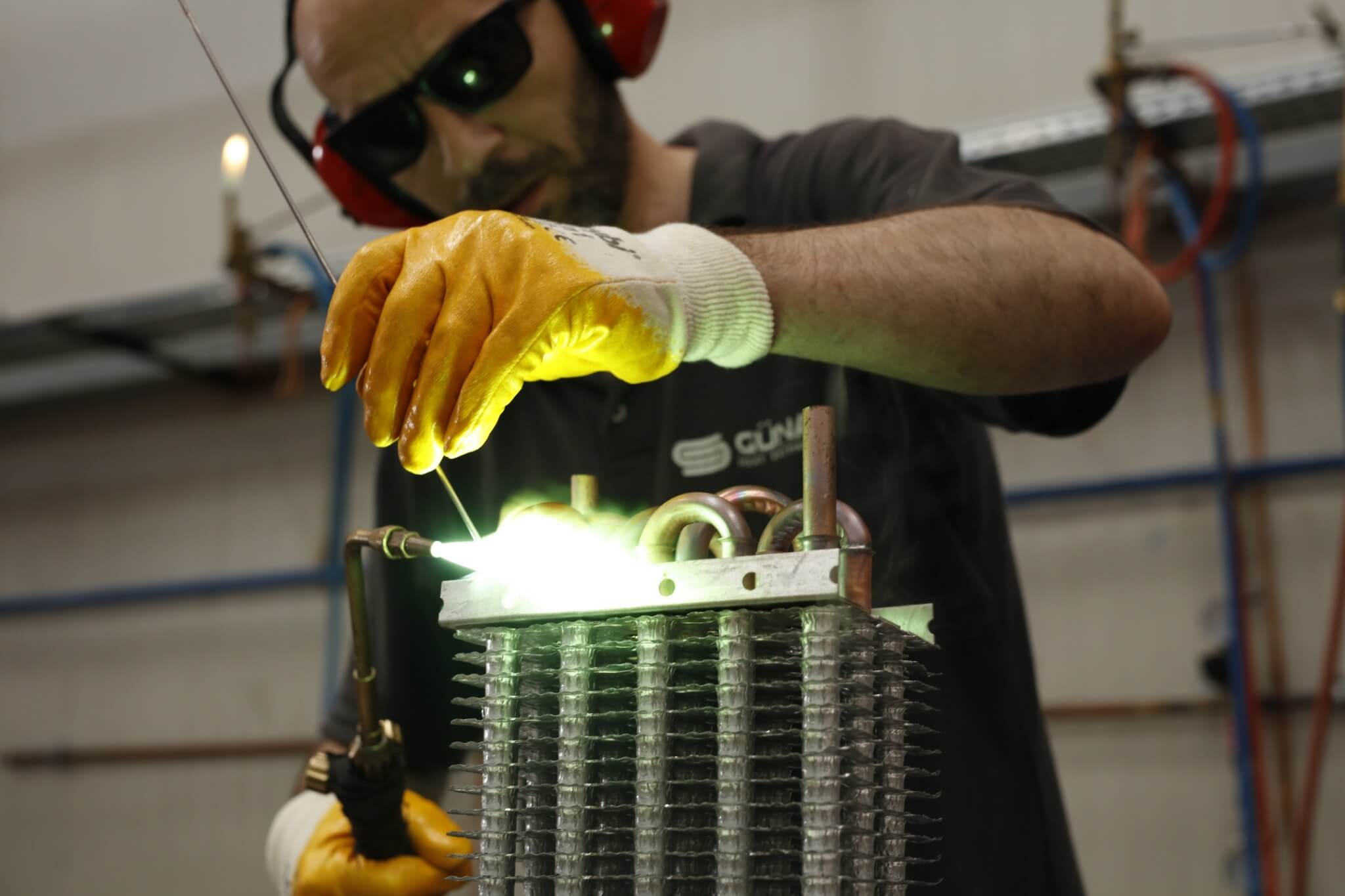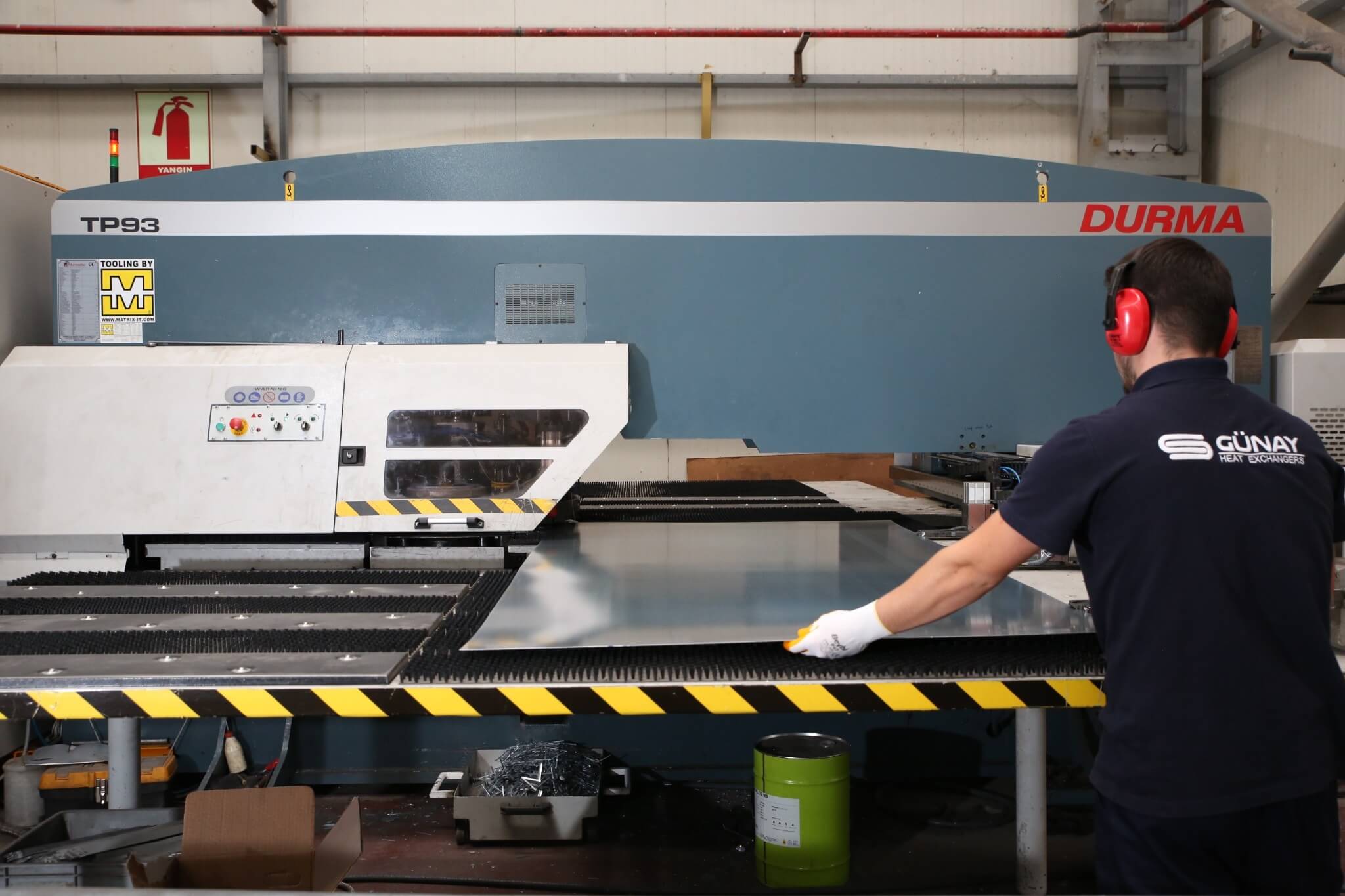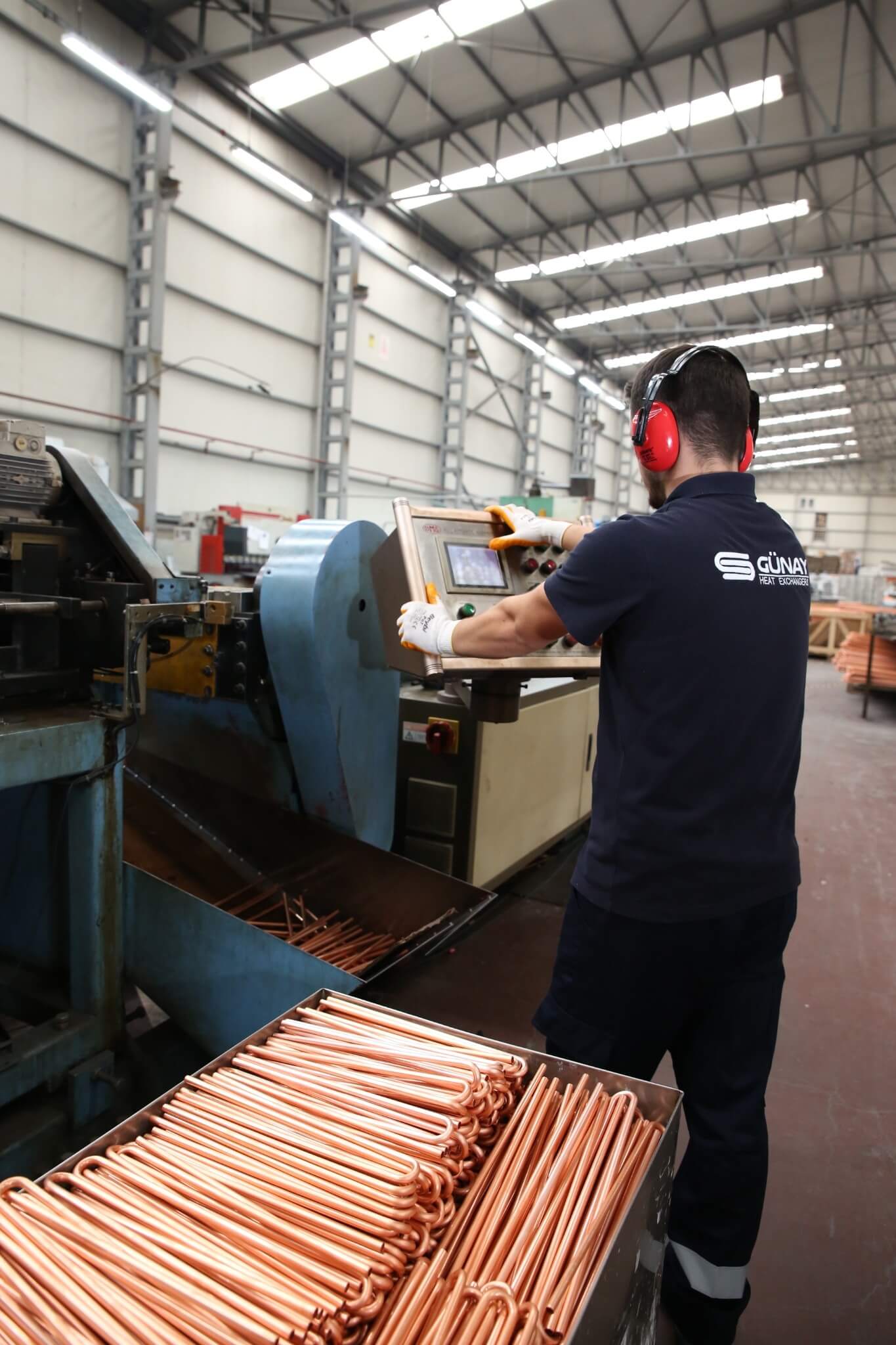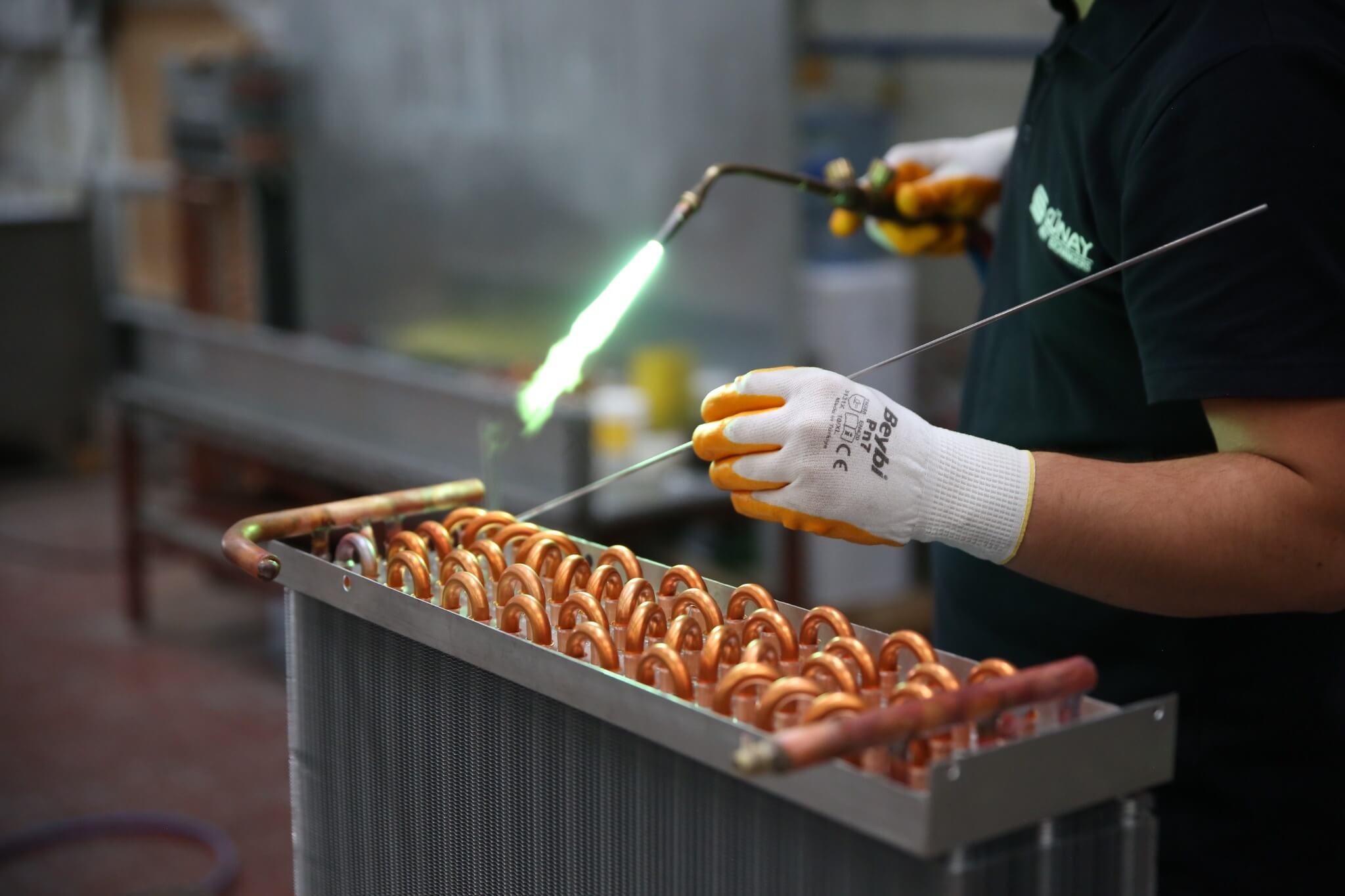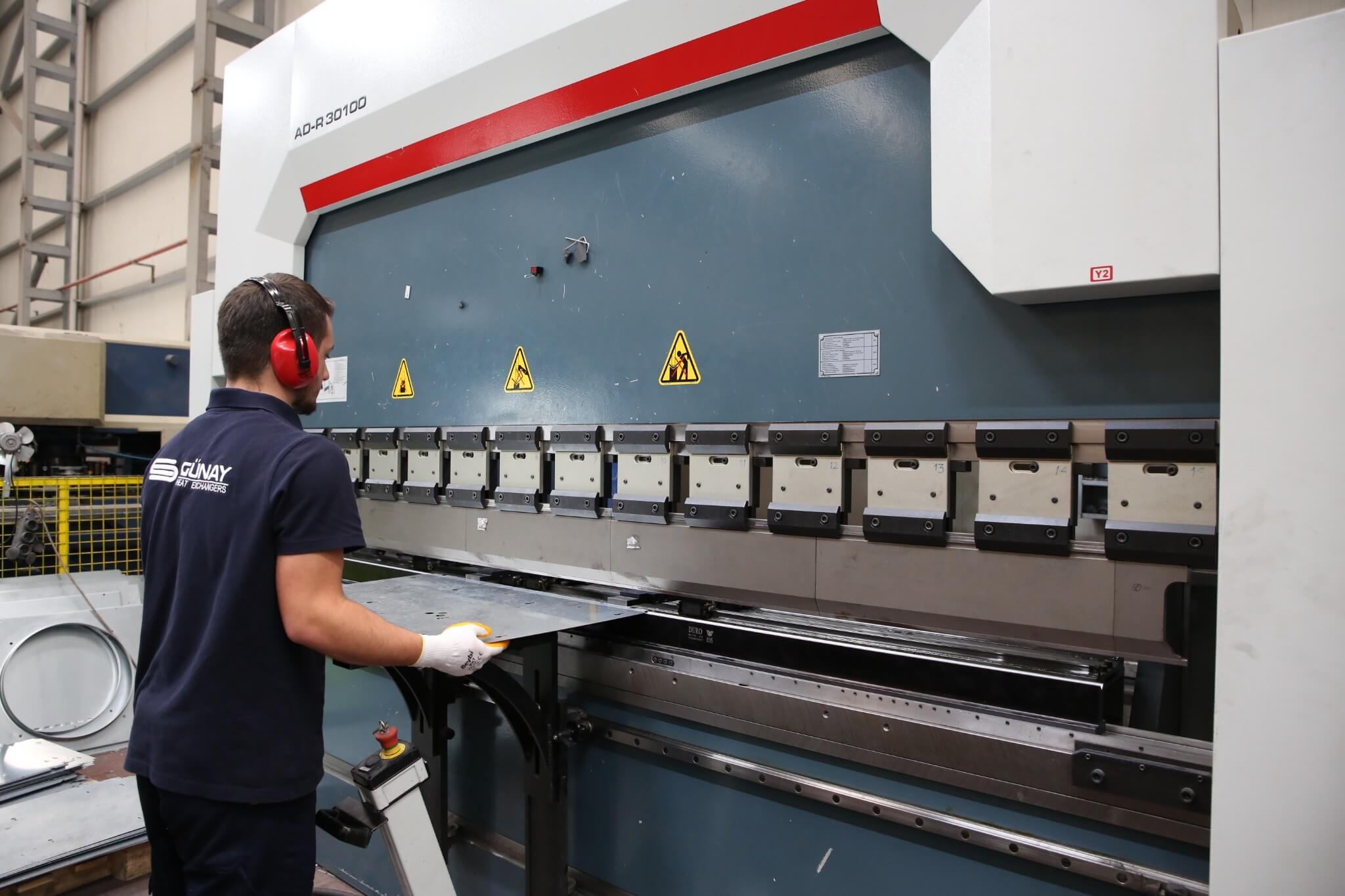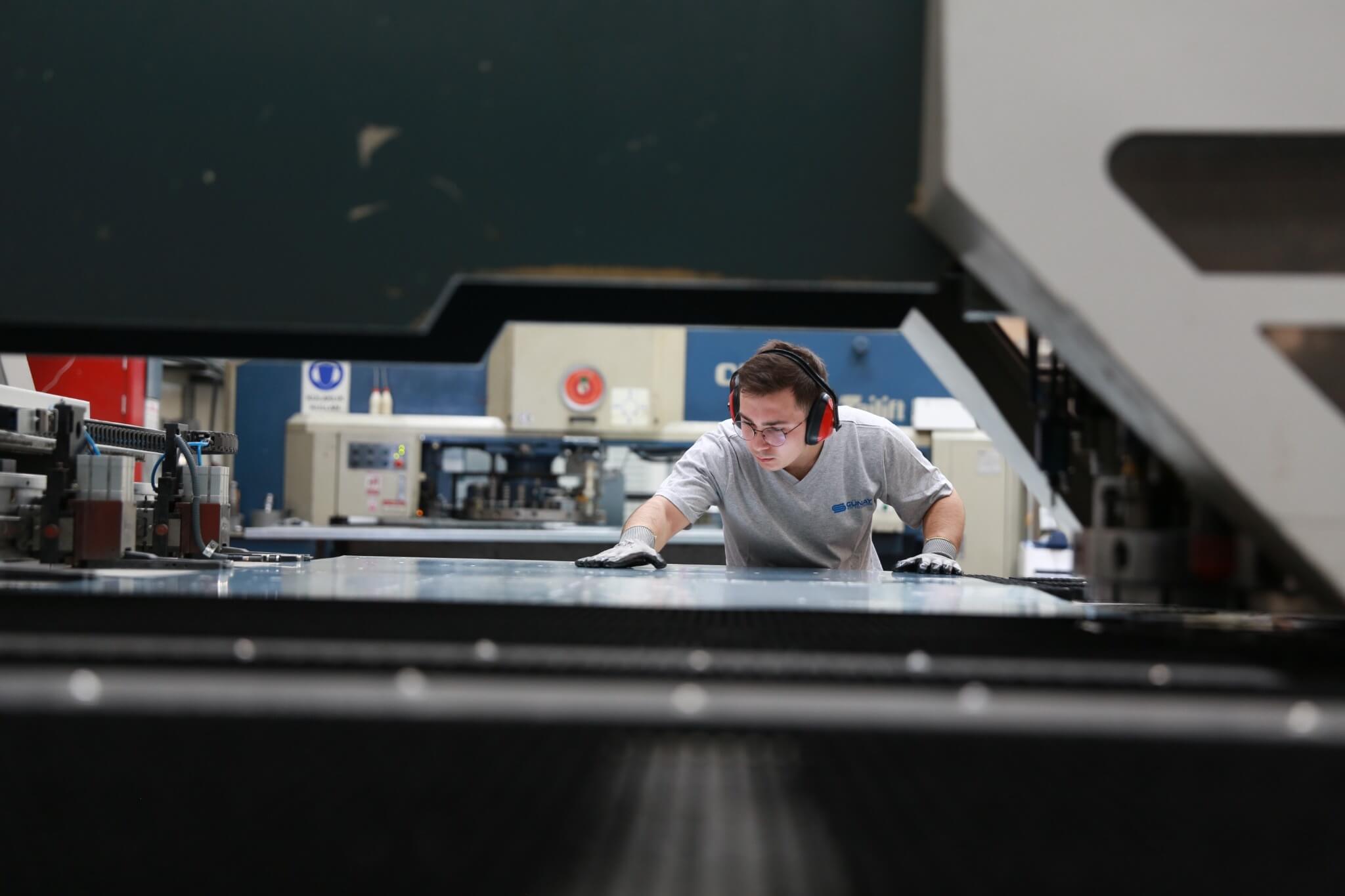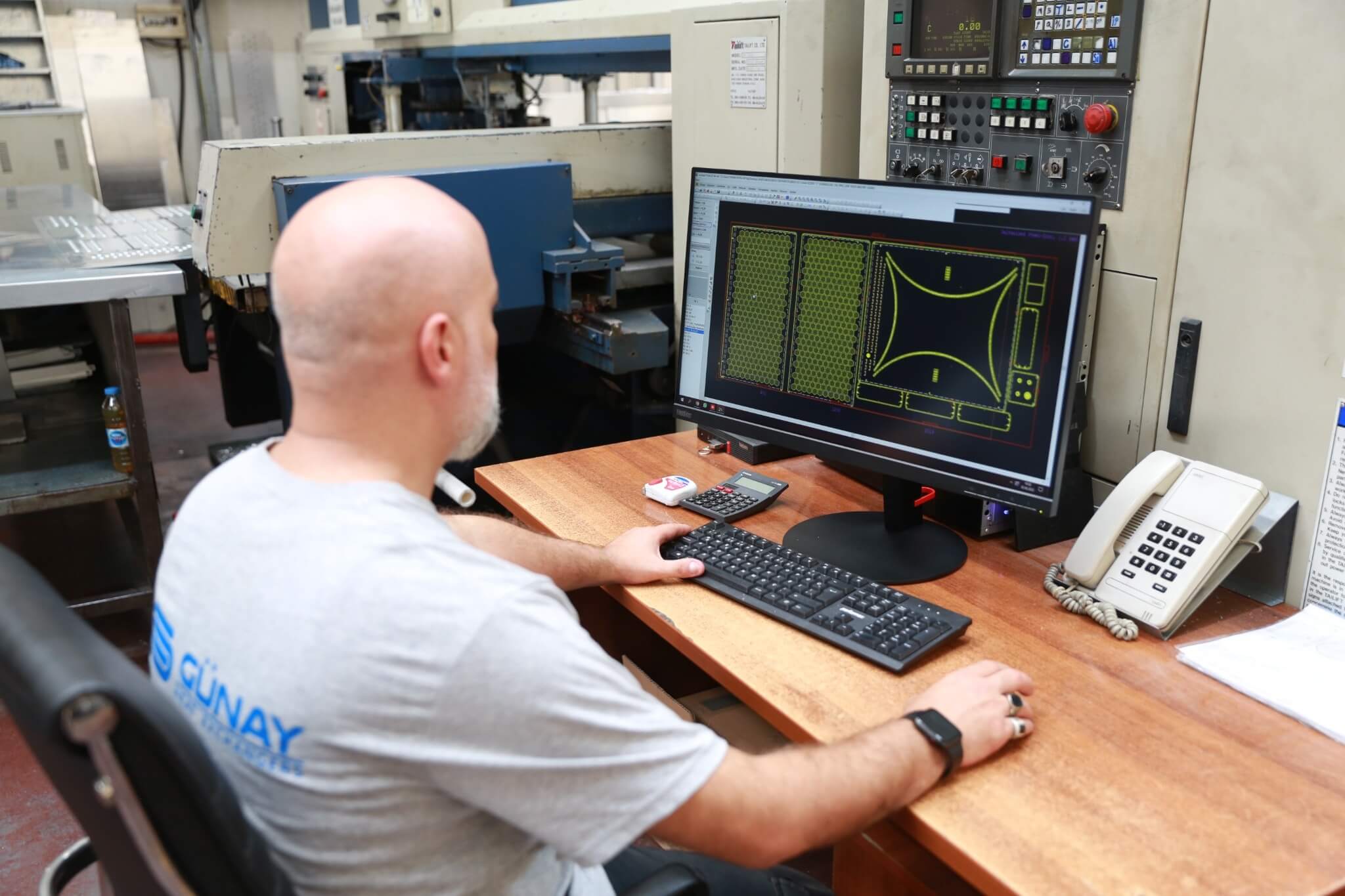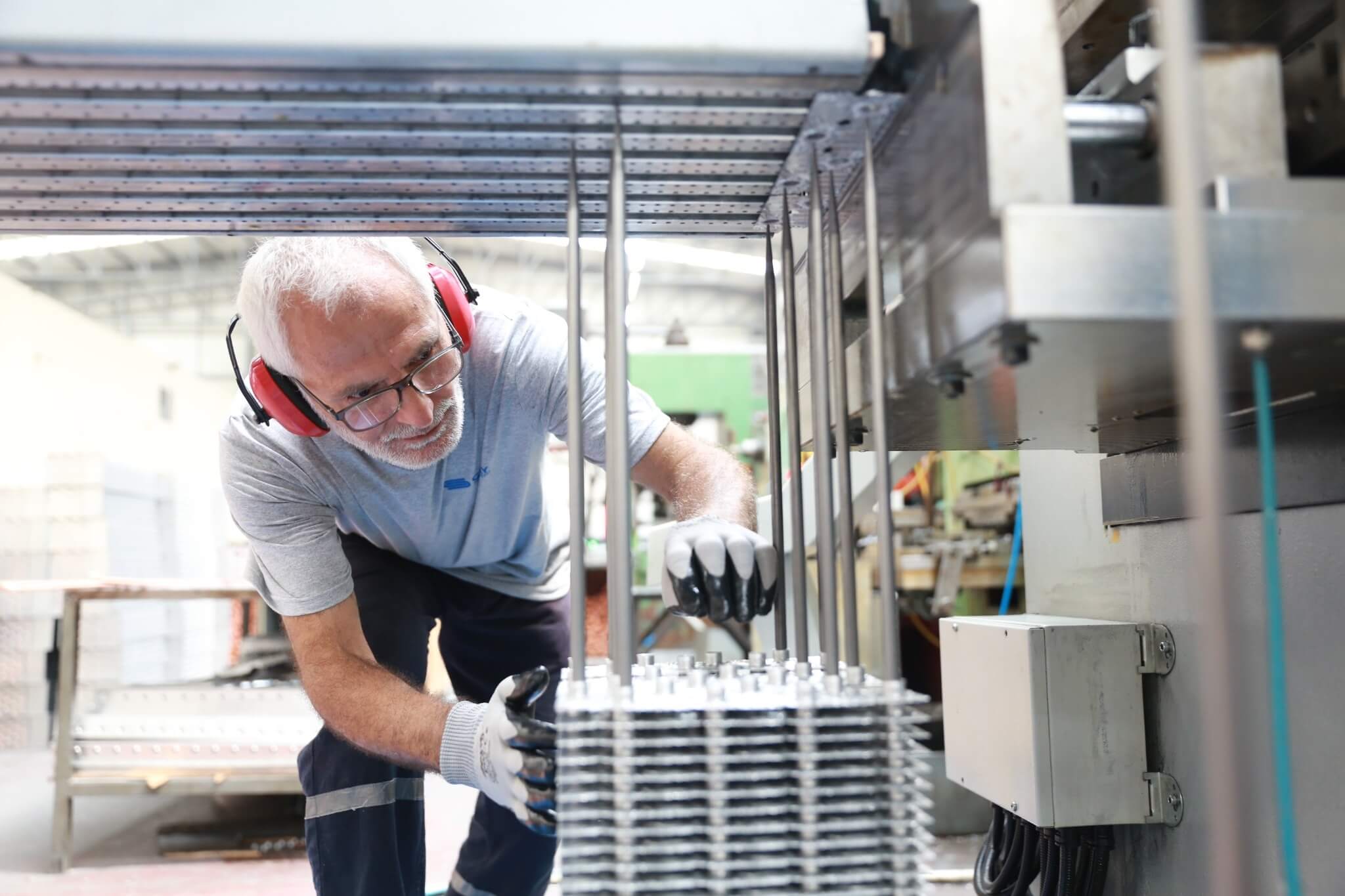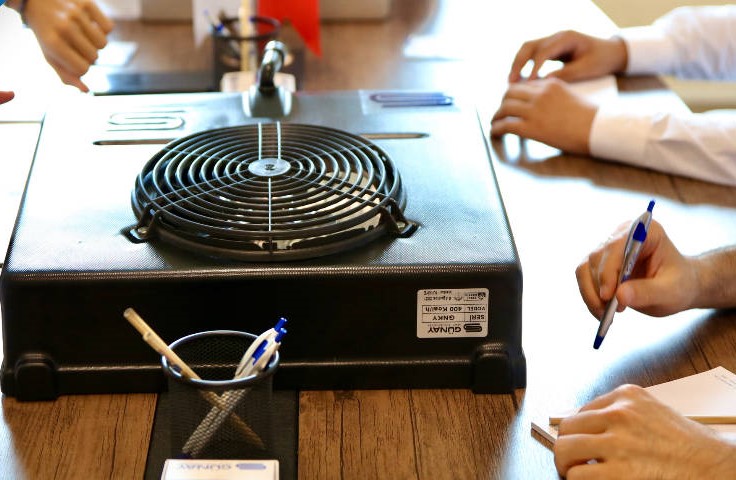At Günay Heat Exchangers, we work to protect natural resources and build a sustainable future. We focus on using eco-friendly practices and maximizing energy efficiency to reduce our impact on the environment. We aim to meet future needs today and add value to society and the environment, ensuring a sustainable life for future generations


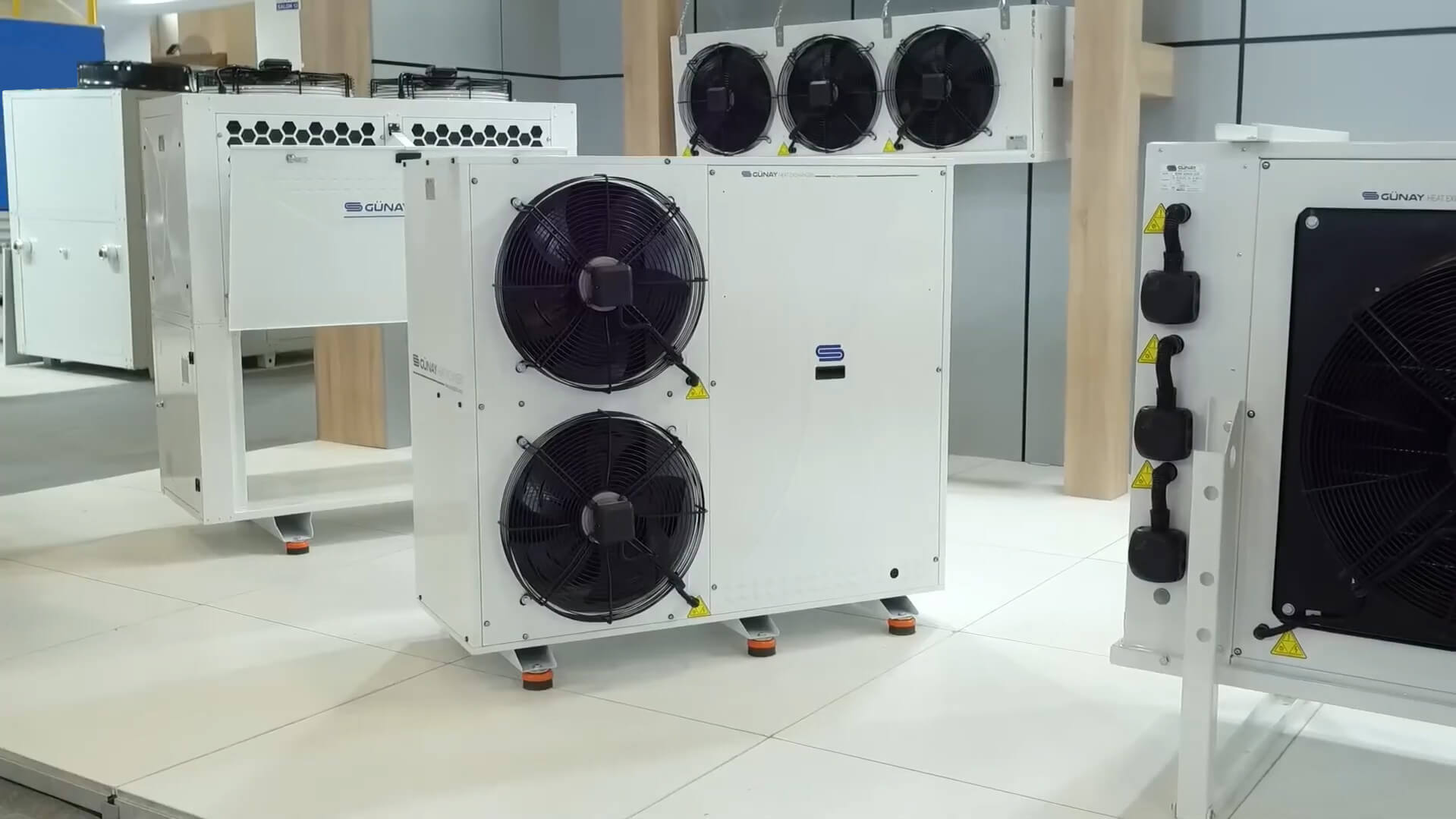
Your Global Solution Partner
We Offer Maximum Efficiency and Satisfaction to Our Customers with Our Services and Products at Global Standards.
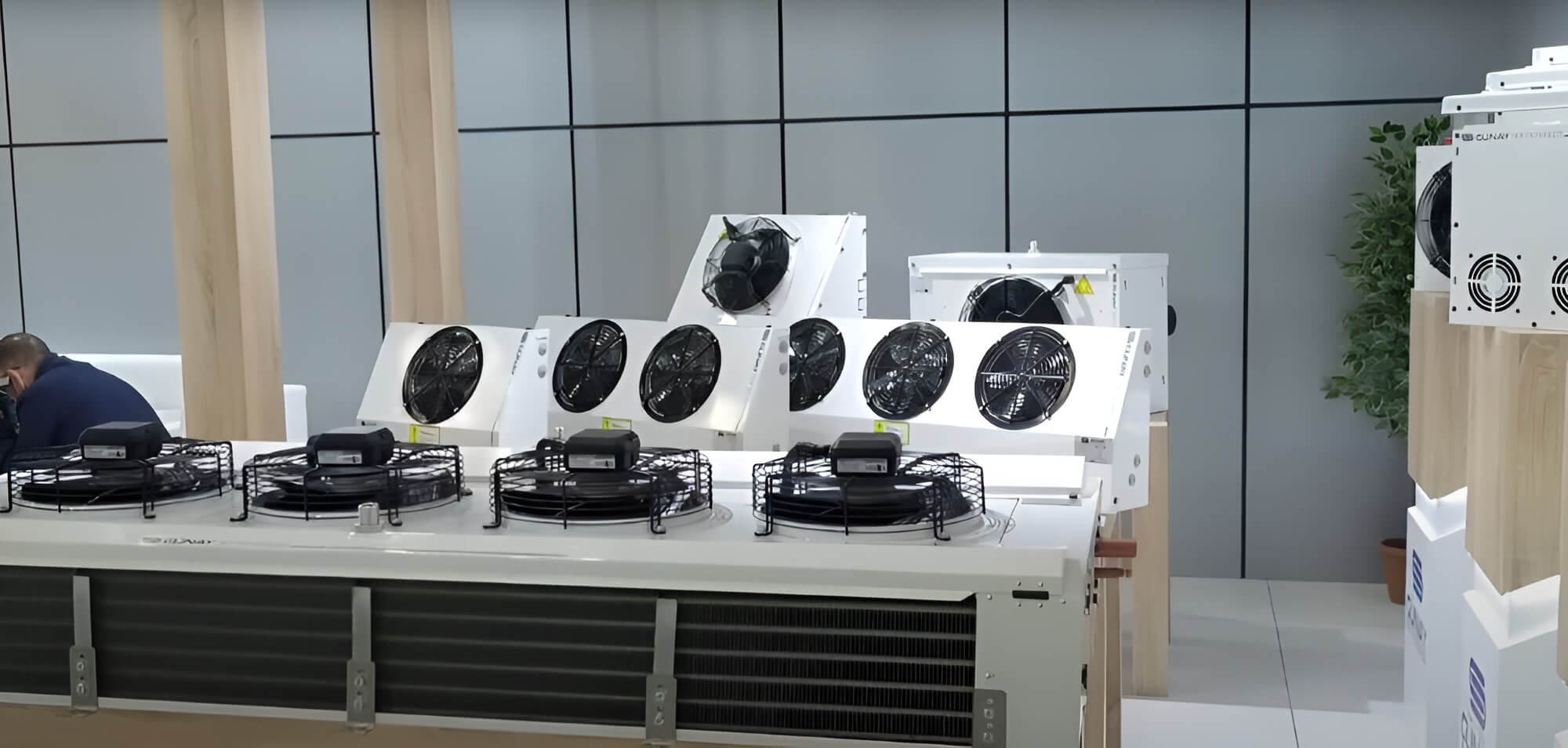
40+ Years of Experience Leading Solutions in Cooling and Heating Sector
Since its establishment in 1986, our company has been serving with serial and special production evaporators, condensers and heat exchangers.

Your Power in the Sector: Gunay Cooling
Since 1986, we offer innovative and customized solutions with our high quality in Evaporators, Condensers and Heat Exchangers. We are working for you with our continuously developing infrastructure and customer-oriented approach.
Innovative Cooling Solutions Offering High Efficiency
Since its establishment in 1986, our company has been offering evaporators, condensers, and heat exchangers both in mass production and as custom-made. Embracing both traditional and modern service approaches, Günay Heat Exchangers continues to evolve by constantly updating its infrastructure in line with industry innovations and customer expectations.
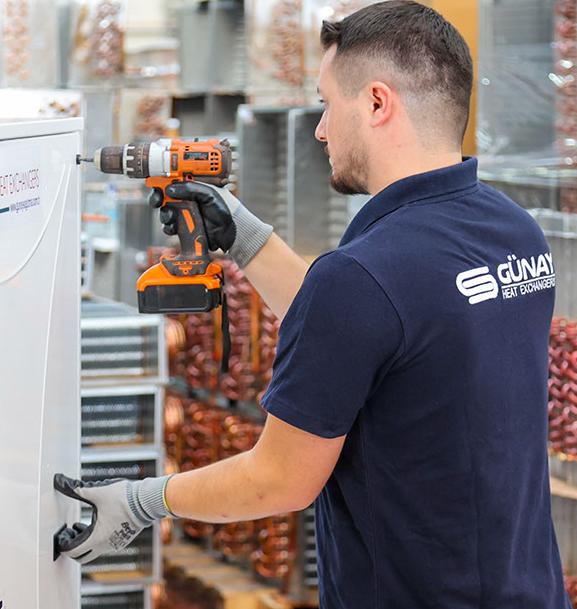
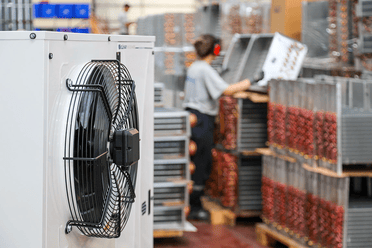
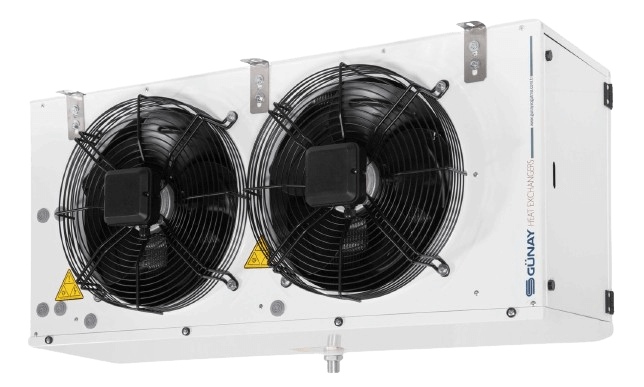
Evaporators
An evaporator is an essential component of cooling systems. Typically designed as a serpentine coil, it enables the refrigerant to evaporate and absorb heat from the surrounding environment. During this process, heat is transferred from the surroundings, thereby lowering the ambient temperature and achieving the desired cooling effect.
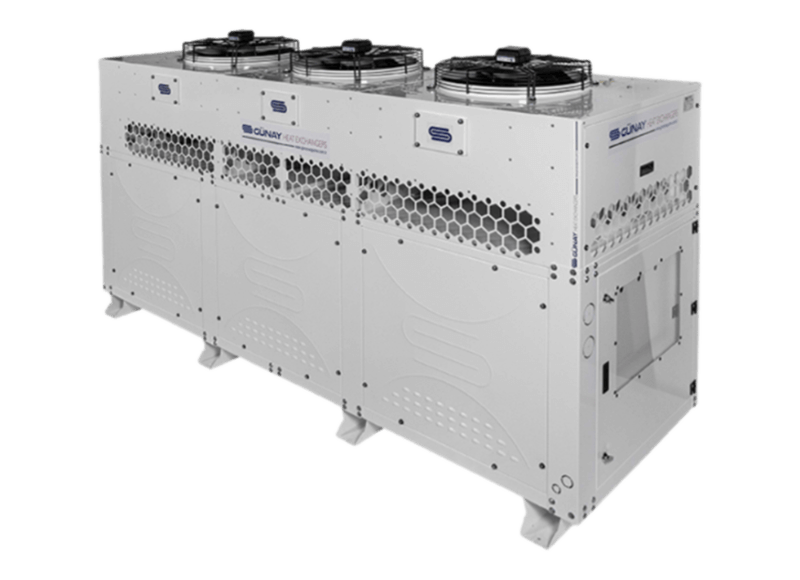
Condensers
The main function of a condenser is to condense the refrigerant gas into a liquid in the cooling cycle. During this process, the heat from the refrigerant gas is released to the surroundings, and the refrigerant condenses into a liquid form.
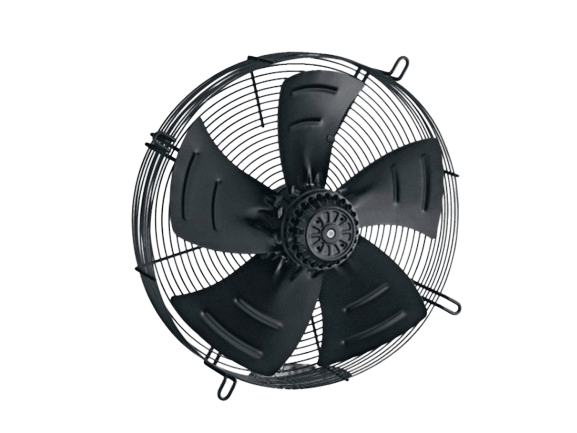
Axial Fans
Axial fans are designed to provide high airflow and play a critical role in industrial cooling solutions. These fans, which move air forward along the axis of the fan blades, are known for delivering high-volume airflow at low pressure. Thanks to these characteristics, they are an ideal solution for applications such as ventilating, cooling, or heating large areas.
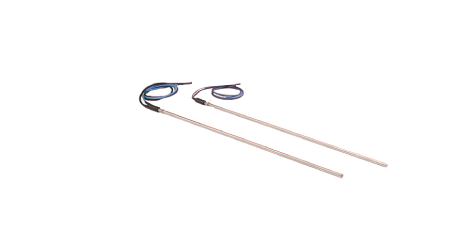
Resistances
Defrost is the process of melting frost and ice that accumulate on the surfaces of air coolers. In cold storage rooms, industrial kitchen sections, and similar areas where defrosting is needed, heaters provide suitable solutions for various heating requirements with different size and power options.
We Are With You Every Step of the Way
Safe Choice
0
+
Export to Countries
0
%
Customer Satisfaction
0
+
Employees
Branches
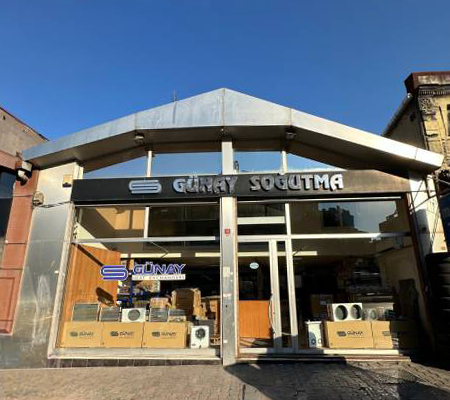
Kocatepe Mahallesi Irmak Cad. No:43-45 Beyoğlu Dolapdere/İstanbul
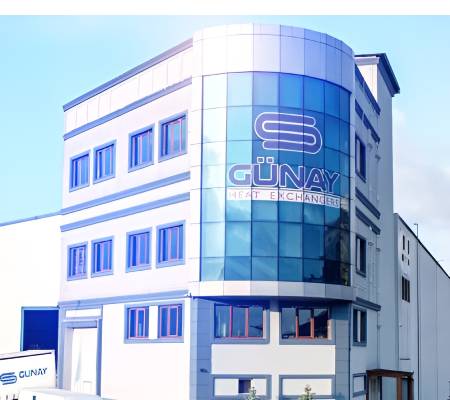
Yassıören Mahallesi Akpınar Sanayi Bölgesi Fırat Sokak No:6/1 Hadımköy-Arnavutköy/İstanbul
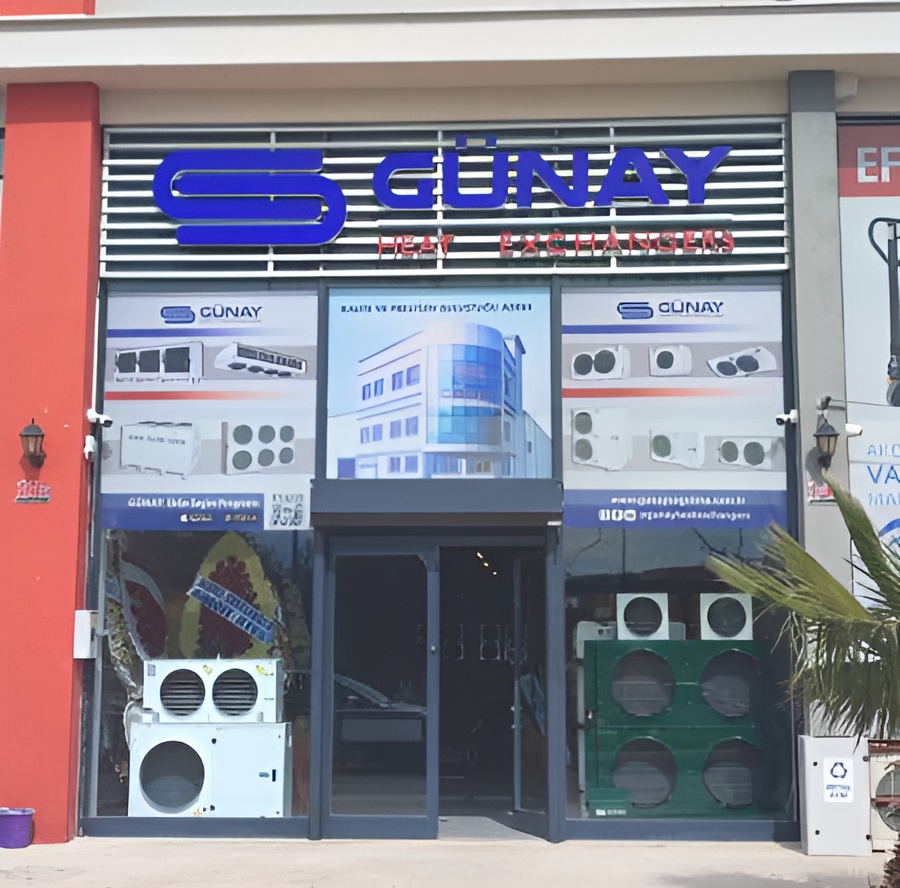
Beşkonaklılar Mahallesi Kırçiçeği Caddesi No:13E Corner City Plaza Kepez/Antalya
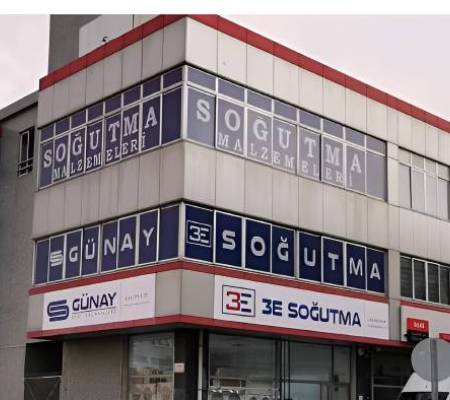
Barbaros Burak Reis Caddesi No:112 D:A, 35090 Bornova/İzmir
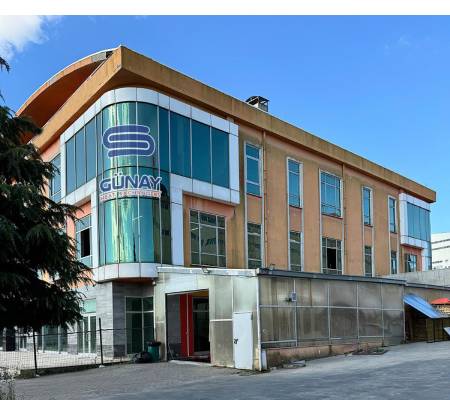
Yassıören Mahallesi Belde Sokak No:17 Hadımköy-Arnavutköy/İstanbul

Education Workshop
Product Selection Program
Günay Heat Exchanger's Product Selection Program allows users to quickly and accurately select products such as evaporators, condensers, and heat exchangers. With its user-friendly interface and intelligent algorithm, it recommends the most suitable solutions for your industry and needs. As Günay Heat Exchanger, we are continuously enhancing the Product Selection Program to provide our customers with a superior experience and to simplify their work.
Blog
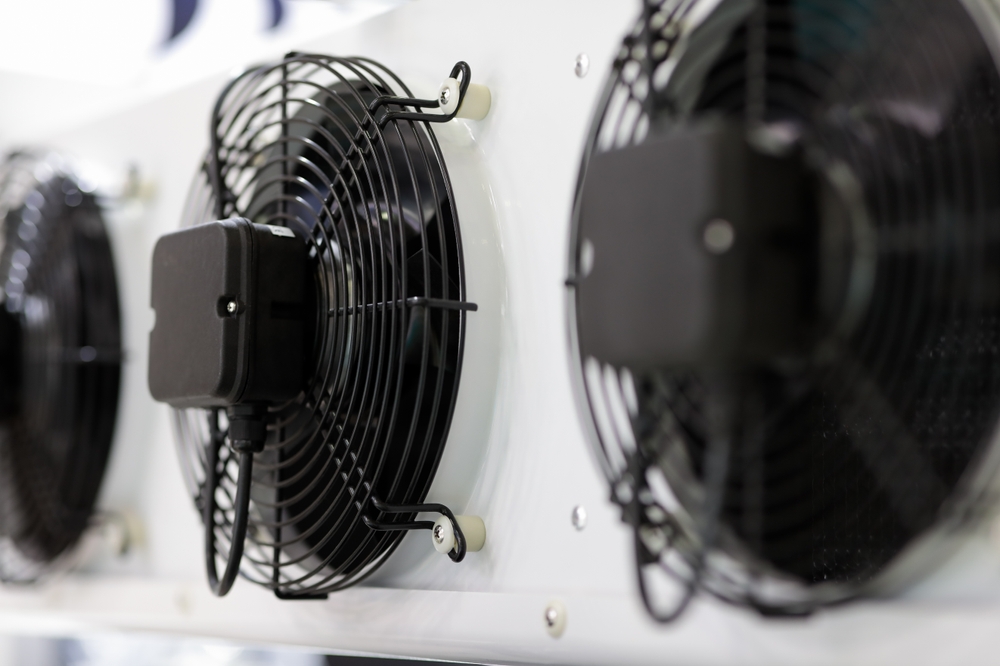
Table of Contents The Ultimate Guide to Industrial Axial Fans: Types, Applications, and Selection Criteria Tube Axial vs. Vane Axial Fans: Which is Better for Your Industrial Process? What are the 5 Main Axial Fan Types Used in Heavy-Duty Industrial Settings? When Should You Choose an Industrial Axial Fan Over a Centrifugal Fan? A Comprehensive Comparison: Propeller, Tube Axial, and Vane Axial Fans for Industrial Ventilation How to Select the Right Axial Fan Type for High-Temperature Industrial Applications The Ultimate Guide to Industrial Axial Fans: Types, Applications, and Selection Criteria The effective management of airflow is a cornerstone of modern industrial processes, impacting everything from worker safety to operational efficiency. A comprehensive resource like The Ultimate Guide to Industrial Axial Fans: Types, Applications, and Selection Criteria provides an essential framework for understanding the fundamental principles of air movement and fan dynamics. This guide serves as a critical tool for engineers tasked with designing or optimizing ventilation systems where precise static pressure management is paramount for system performance. Understanding the different fan types is crucial for correct application. The guide meticulously details the operational characteristics of axial fans, distinguishing them from centrifugal models and explaining their suitability for high-volume, low-pressure scenarios. It covers key performance metrics, including fan efficiency and aerodynamic performance, which directly correlate with energy consumption and long-term operational costs. This technical depth ensures that selection is based on quantifiable data rather than estimation. For commercial decision-makers, the guide translates technical specifications into tangible business benefits. It outlines how proper selection based on accurate performance curves can lead to significant reductions in energy usage, aligning capital expenditure with sustainability goals. The document also addresses the importance of noise control and acoustic performance, which are critical for compliance with workplace regulations and enhancing employee comfort in industrial settings. The selection criteria section is particularly valuable, providing a systematic approach to matching fan capabilities with specific industrial needs, such as HVAC systems for large facilities or targeted process cooling for machinery. It emphasizes factors like material compatibility for corrosive environments and the operational demands of heat exchange applications. This practical focus ensures that the chosen equipment from experts like Günay Soğutma delivers reliability and longevity, minimizing downtime and maintenance costs. This guide empowers professionals to make informed, optimized decisions. It bridges the gap between theoretical aerodynamics and real-world industrial requirements, ensuring that investments in ventilation and cooling infrastructure are sound, efficient, and future-proof. By leveraging such a detailed resource, companies can achieve superior environmental control and enhanced operational productivity. Tube Axial vs. Vane Axial Fans: Which is Better for Your Industrial Process? In industrial ventilation and process cooling systems, the choice between a tube axial fan and a vane axial fan is a critical technical decision that directly impacts operational efficiency and total cost of ownership. Both designs belong to the axial flow family, moving air parallel to the fan shaft, but their internal geometries and resultant performance characteristics differ substantially. The fundamental distinction lies in the presence of an outlet guide vane assembly. A standard tube axial fan is characterized by its simplicity, featuring a propeller or impeller mounted within a cylindrical casing. This straightforward design makes it highly effective for moving large volumes of air against very low static pressure requirements. Applications such as general warehouse ventilation, spot cooling, and fume dilution, where the primary need is high airflow rate with minimal system resistance, are ideal for this fan type. Its mechanical simplicity often translates to a lower initial investment and ease of maintenance. The vane axial fan, however, incorporates a set of stationary guide vanes either downstream or upstream of the impeller. These vanes serve a crucial function: they recover the rotational velocity, or swirl, imparted to the air by the spinning propeller, converting it into useful static pressure. This aerodynamic efficiency allows vane axial models to achieve significantly higher pressures than their tube axial counterparts of comparable diameter and speed. This makes them suitable for systems with longer ductwork, heat exchangers, or other components that create substantial system resistance. When evaluating energy consumption over the fan's lifecycle, the vane axial's superior efficiency often leads to considerable operational savings, despite its higher upfront cost. The guide vanes also contribute to a more stable, non-swirling airflow, which can be critical for processes requiring precise air handling. For demanding applications like industrial ovens, paint spray booths, or engineered smoke exhaust systems, the vane axial fan's performance is typically superior. The selection is not about which fan is universally better, but which is optimal for your specific system curve and operational goals. A thorough analysis of the required airflow, static pressure, and acoustic performance is essential. Partnering with an experienced manufacturer like Günay Soğutma ensures access to detailed performance data and engineering support to make this critical technical and commercial decision with confidence. What are the 5 Main Axial Fan Types Used in Heavy-Duty Industrial Settings? In heavy-duty industrial settings, the selection of an appropriate axial fan is a critical engineering decision that directly impacts system efficiency, operational costs, and process reliability. The fundamental principle of an axial fan involves moving air parallel to the fan's shaft, making it ideal for applications requiring high-volume airflow against relatively low-pressure systems. Among the most common variants is the vaneaxial fan, which incorporates downstream guide vanes to straighten the swirling airflow, significantly improving static pressure efficiency. For applications demanding rugged durability, the tubeaxial fan offers a robust solution, often featuring a cylindrical housing that protects the propeller and enhances structural integrity in harsh environments like chemical processing or mining ventilation. When space constraints or specific aerodynamic profiles are a concern, the airfoil axial fan becomes essential; its blades are shaped like aircraft wings to minimize drag and maximize aerodynamic efficiency, leading to substantial energy savings. Variable pitch axial fans represent a pinnacle of operational control, allowing for real-time adjustment of blade angle to modulate airflow without changing the motor speed, which is crucial for processes with fluctuating demand. For the most extreme duties involving high temperatures, corrosive fumes, or abrasive particulate matter, heavy-duty industrial axial fans from manufacturers like Günay Soğutma are engineered with specialized materials and reinforced construction to ensure longevity and minimal downtime. The specific application dictates the optimal choice; for instance, a vaneaxial fan is superior for complex ductwork requiring higher pressure capabilities, while a simple tubeaxial model may suffice for general warehouse ventilation. Key performance metrics such as CFM (Cubic Feet per Minute) and system pressure drop must be meticulously calculated to ensure the selected fan meets the system resistance of the installation. Proper selection is not merely about moving air but about optimizing the entire system for energy consumption, acoustic performance, and operational reliability. Investing in the correct axial fan technology, backed by the engineering expertise of a proven supplier like Günay Soğutma, translates directly into enhanced process control, reduced total cost of ownership, and improved compliance with industrial sustainability standards. The commercial benefit lies in matching the fan's capabilities precisely to the application's demands, avoiding both under-performance and wasteful over-engineering. When Should You Choose an Industrial Axial Fan Over a Centrifugal Fan? The decision between an industrial axial fan and a centrifugal fan hinges on a fundamental understanding of airflow characteristics and system pressure requirements. An axial fan is engineered to move high volumes of air parallel to the fan shaft, operating efficiently in low-pressure environments. This makes it the ideal solution for applications requiring substantial air movement with minimal resistance, such as general ventilation in warehouses, heat exchangers, or condenser cooling. When system static pressure is low, axial fans offer superior energy efficiency due to their simpler aerodynamic principle. The propeller-like blades directly push air, resulting in lower power consumption for equivalent airflow compared to a centrifugal fan under the same low-pressure conditions. This operational efficiency is a critical factor for continuous processes where reducing operating costs is a primary commercial objective. Centrifugal fans, by contrast, excel in applications demanding high pressure, as they accelerate air radially, converting velocity into pressure. Therefore, the choice is clear: select an axial fan for high-volume, low-pressure duties. This includes scenarios like removing light fumes, providing spot cooling for machinery, or managing air turnover in large spaces. The compact design of axial fans also facilitates easier integration into ductwork or walls where space is a constraint. For engineers specifying equipment for processes like drying ovens or paint spray booths that require overcoming significant resistance, a centrifugal design is typically mandated. However, in many industrial ventilation and cooling systems, the axial fan provides the most cost-effective and efficient solution. The robust construction of Günay Soğutma's axial fans ensures reliable performance in demanding environments, contributing to lower lifetime total cost of ownership. The correct selection maximizes system performance and minimizes energy expenditure. A thorough analysis of the system curve is essential. By accurately plotting required airflow against static pressure, it becomes evident whether the application falls within the high-efficiency operating range of an axial fan, making it the technically and commercially superior choice for a wide array of industrial applications. A Comprehensive Comparison: Propeller, Tube Axial, and Vane Axial Fans for Industrial Ventilation The selection of an appropriate industrial ventilation fan is a critical decision impacting system energy efficiency, operational noise, and long-term maintenance costs. Among the primary options, propeller fans are characterized by their simple design, featuring a few blades mounted directly on a motor hub. This configuration excels in moving large volumes of air against very low static pressures, making them ideal for applications like general warehouse ventilation or heat expulsion. For systems requiring higher performance, tube axial fans represent a significant step up. These units encase the propeller within a cylindrical cylinder, which straightens the airflow and improves the fan's ability to handle moderate static pressures. The enhanced aerodynamic performance of the tube axial design makes it suitable for moving air through longer duct runs, such as in factory fume extraction or drying processes, though it still exhibits some rotational air motion, or swirl. The most advanced option within this category is the vane axial fan. This design incorporates stationary guide vanes, either upstream or downstream of the rotor, which serve to recover the rotational energy from the airstream. This pressure recovery mechanism significantly boosts static pressure capability and overall efficiency. Vane axial fans are the preferred solution for high-pressure applications, including combustion air supply, sophisticated HVAC systems, and demanding industrial process ventilation where precise airflow control is paramount. When evaluating these fans, the specific operating point on the fan curve is essential. A propeller fan may be inefficient and noisy if forced to operate outside its low-pressure range, whereas a vane axial fan provides superior performance at higher pressures. The mechanical construction also differs; vane axial fans, with their integrated guide vanes, often offer a more robust housing design conducive to inline installation, while propeller fans are typically mounted in a panel or wall. For engineers and decision-makers, a thorough understanding of system resistance and required CFM (Cubic Feet per Minute) is the foundation for a correct selection. Partnering with an experienced manufacturer like Günay Soğutma ensures access to detailed performance data and expert guidance to match the ideal fan technology—propeller, tube axial, or vane axial—to the unique demands of the industrial application, optimizing both capital and operational expenditure. How to Select the Right Axial Fan Type for High-Temperature Industrial Applications Selecting the appropriate axial fan for high-temperature industrial applications is a critical engineering decision that directly impacts operational efficiency, system longevity, and total cost of ownership. The primary challenge lies in managing thermal expansion, which can cause catastrophic failure if the fan's components expand at different rates, leading to seizure or imbalance. Engineers must prioritize designs that accommodate this physical phenomenon through precise material selection and mechanical tolerancing. The cornerstone of a reliable high-temperature axial fan is its material composition. Standard aluminum or carbon steel constructions are unsuitable; instead, specialized alloys and stainless steels are required to maintain structural integrity under continuous thermal stress. The impeller, shaft, and housing must all be selected for their high-temperature yield strength and resistance to oxidation, ensuring they do not degrade or warp over time. Beyond materials, the bearing system is arguably the most vulnerable component. Standard grease-lubricated bearings will fail quickly in extreme heat. Solutions from Günay Soğutma often incorporate high-temperature greases, water-cooled bearing housings, or even air-cooled systems to maintain the bearing operating temperature within a safe range, which is essential for achieving a long service life. A thorough performance curve analysis is non-negotiable. Air density decreases significantly at elevated temperatures, dramatically affecting the fan's pressure generation and power consumption. A fan selected based on standard air density will be severely undersized. The analysis must confirm that the fan can deliver the required static pressure and volumetric flow rate at the actual operating temperature to avoid system underperformance. Applications such as fume extraction, industrial ovens, and drying processes demand fans with robust motor cooling mechanisms. In these contexts, a belt drive configuration is frequently superior to a direct drive, as it physically separates the motor from the hot air-stream, protecting it from heat saturation. This configuration also allows for flexibility in speed control to fine-tune performance without compromising the motor. A successful selection process involves a holistic view of the operating environment, including potential contaminants and cyclic thermal loads. Partnering with an experienced manufacturer like Günay Soğutma ensures access to technical expertise for customizing fans that meet specific application requirements, guaranteeing reliability and optimizing the return on investment for demanding industrial processes.
Read More
Table of Contents How Does Resistance Life Extension Work? A Technical Overview of Operation and Maintenance The Ultimate Guide to Extending Resistor Lifespan: Proactive Maintenance and Cost-Saving Strategies Essential Maintenance Tips to Maximize Resistance Life and Reduce Operational Costs Resistance Life Extension: A Comparative Analysis of Reactive vs. Proactive Maintenance Strategies What Are the Key Factors Influencing Resistor Degradation and How to Control Them? Calculating the ROI of Resistance Life Extension: A Guide to Quantifying Maintenance Savings How Does Resistance Life Extension Work? A Technical Overview of Operation and Maintenance Resistance Life Extension represents a sophisticated engineering discipline focused on proactively increasing the service life of critical industrial components subjected to harsh operational environments. The core principle involves a systematic approach to predictive maintenance, shifting from reactive repairs to a data-driven strategy that anticipates failure. This methodology is fundamentally reliant on continuous condition monitoring to assess the real-time health of assets. Operation begins with the strategic deployment of sensors that track key performance indicators such as vibration, temperature, and corrosion rates. This data stream is analyzed to establish baseline performance profiles and identify deviations that signal the onset of material degradation. For systems like those engineered by Günay Soğutma, this allows for the precise scheduling of maintenance interventions before a minor issue escalates into a catastrophic failure, thus optimizing operational efficiency. The maintenance protocol is inherently proactive, focusing on preventive measures rather than corrective actions. This can include targeted lubrication, component recalibration, or the application of protective coatings based on the sensor data. The primary commercial benefit is a significant reduction in unplanned downtime, which directly translates to higher production throughput and lower lifetime total cost of ownership. In practical application, Resistance Life Extension is crucial for capital-intensive equipment such as industrial chillers, compressors, and heat exchange systems. By mitigating the effects of thermal stress and chemical exposure, the technology ensures asset reliability over extended periods. The integration of this approach into the design and service philosophy of Günay Soğutma systems provides a compelling value proposition for managers seeking to maximize ROI and ensure continuous operational integrity in demanding industrial contexts. The Ultimate Guide to Extending Resistor Lifespan: Proactive Maintenance and Cost-Saving Strategies In the demanding landscape of industrial operations, the failure of a single component like a power resistor can trigger costly unplanned downtime and compromise entire systems. The core philosophy of the guide is a shift from reactive replacement to proactive maintenance, a strategic approach that systematically addresses the primary causes of resistor degradation. Effective lifespan extension begins with a rigorous failure analysis to identify common failure modes, such as thermal runaway or mechanical fracture. Understanding these root causes allows for the implementation of targeted strategies, including precise derating guidelines to ensure components operate well within their specified limits, thereby significantly reducing thermal stress. A critical application focus is on managing thermal management, as excessive heat is the predominant enemy of resistor longevity. The guide details advanced cooling techniques and the strategic integration of systems from partners like Günay Soğutma, which are essential for maintaining optimal operating temperatures in high-ambient environments. Beyond temperature, the guide emphasizes the importance of environmental protection. It provides actionable protocols for shielding resistors from contaminants, moisture, and vibration, all of which can accelerate wear and lead to premature component failure. Implementing these protective measures is a cornerstone of predictive maintenance programs. The commercial impact is directly quantifiable through a detailed total cost of ownership analysis. By extending mean time between failures (MTBF), organizations realize substantial savings not only on spare parts but, more importantly, on avoided production losses and maintenance labor. For product managers and engineers, this resource translates technical reliability engineering principles into a practical framework for design and upkeep. It empowers teams to build more robust systems and implement a data-driven maintenance schedule, transforming resistors from a recurring expense into a model of operational durability and efficiency. Essential Maintenance Tips to Maximize Resistance Life and Reduce Operational Costs In industrial systems, the longevity of heating and cooling components is not merely a matter of product quality but a direct function of disciplined operational protocols and preventive maintenance strategies. The financial impact of premature resistance failure extends beyond replacement part costs, encompassing significant production downtime and energy inefficiency. A systematic approach to maintenance is therefore a critical lever for controlling operational expenditures and maximizing asset life. One of the most effective tactics is the implementation of rigorous scale prevention measures. Mineral deposits from process water act as an insulating layer on heat exchanger surfaces and resistance elements, forcing the system to work harder to achieve the desired thermal transfer. This results in elevated operating temperatures, increased energy consumption, and accelerated thermal degradation of the resistance. Water treatment programs and regular descaling intervals are non-negotiable for sustaining optimal thermal efficiency. Furthermore, establishing a consistent schedule for condition monitoring allows for the early detection of potential faults before they lead to catastrophic failure. Techniques such as periodic insulation resistance testing (megger testing) can identify the gradual breakdown of a resistance's dielectric strength. Vibration analysis on associated pumps and fans can reveal imbalances that place undue mechanical stress on the entire system. This data-driven approach enables predictive maintenance, shifting interventions from reactive replacements to planned, non-disruptive servicing. Proper calibration of system controllers and thermostats is another frequently overlooked factor. An inaccurate temperature sensor can cause a system to cycle excessively or maintain temperatures outside the ideal operating window, both of which contribute to shortened component life. Ensuring that control systems provide precise feedback is fundamental to maintaining stable operating conditions. The expertise of partners like Günay Soğutma is invaluable in establishing these calibrated baselines and maintenance routines. A holistic maintenance philosophy that integrates scale prevention, proactive condition monitoring, and precise calibration transforms maintenance from a cost center into a strategic investment. This approach directly enhances thermal efficiency, reduces the total cost of ownership, and ensures the reliable performance of critical industrial thermal systems over their entire intended lifespan. Resistance Life Extension: A Comparative Analysis of Reactive vs. Proactive Maintenance Strategies The operational longevity of critical industrial assets is a primary determinant of overall plant profitability, making the choice between reactive maintenance and proactive maintenance a fundamental strategic decision. A reactive approach, often termed run-to-failure, addresses equipment issues only after a breakdown occurs, leading to unplanned downtime, costly emergency repairs, and potential secondary damage. In contrast, a proactive strategy, encompassing both preventative and predictive methodologies, focuses on resistance life extension by systematically combating the factors that cause degradation. The core principle of resistance life extension is to actively manage the stressors that lead to equipment failure, such as corrosion, fouling, and mechanical wear. For systems like heat exchangers and cooling towers, which are vital to processes at facilities like Günay Soğutma, this involves continuous monitoring and pre-emptive intervention. Implementing a condition-based monitoring program allows for the real-time assessment of key performance indicators, enabling maintenance teams to schedule interventions based on actual asset health rather than arbitrary time intervals. This data-driven approach is the foundation of predictive maintenance, a sophisticated subset of proactive strategies. By analyzing trends in vibration, temperature, and fluid chemistry, engineers can forecast potential failures with remarkable accuracy. This shift transforms maintenance from a cost center into a strategic function focused on asset reliability and maximizing mean time between failures (MTBF). The result is a significant reduction in maintenance costs and a dramatic improvement in overall equipment effectiveness (OEE). The financial argument for proactive resistance life extension is compelling. While the initial investment in monitoring technologies and specialized expertise may be higher, the long-term total cost of ownership (TCO) is substantially lower. Companies avoid the high costs of catastrophic failure, production losses, and safety incidents. For commercial decision-makers, this translates into predictable operational budgets, enhanced production capacity, and a stronger competitive position in demanding industrial markets. What Are the Key Factors Influencing Resistor Degradation and How to Control Them? Resistor degradation is a critical reliability concern in industrial electronics, directly impacting product longevity, system safety, and total cost of ownership. The primary factor influencing this degradation is operational temperature, where exceeding the component's maximum load rating accelerates chemical changes within the material. This thermal stress can lead to drift in the nominal resistance value, compromising circuit accuracy and potentially causing system failure. Effective thermal management, therefore, is not an option but a fundamental design requirement for robust industrial applications. Environmental conditions play an equally significant role, with humidity being a major antagonist. Moisture ingress can cause corrosion of internal terminations and lead to a decrease in the insulation resistance, creating leakage paths and posing an electrical safety risk. In harsh settings, such as those near chemical processing or marine environments, contaminants can further exacerbate this effect. Selecting resistors with appropriate conformal coatings or hermetic seals is a key mitigation strategy to ensure long-term stability and protect the component's integrity. The electrical environment itself contributes to degradation through mechanisms like surge events and continuous overload. Repeated voltage or current spikes can cause microscopic damage to the resistive element, leading to a permanent shift in value. For applications involving high power dissipation, such as motor drives or power supplies, choosing a resistor with a sufficient safety margin and a design that promotes effective heat sinking is paramount. This proactive approach minimizes the risk of catastrophic failure modes. Controlling these factors requires a holistic system design philosophy. It begins with component selection, prioritizing parts known for high reliability and proven performance under stress. The physical layout on the printed circuit board must facilitate adequate airflow and heat transfer. Forced air cooling systems, such as those engineered by Günay Soğutma, provide an active solution for managing thermal performance in densely packed enclosures, directly combating the primary cause of resistor degradation. Understanding and controlling resistor degradation is an exercise in predictive engineering. By analyzing the operational environmental stress and implementing appropriate countermeasures—from component choice to advanced cooling—engineers and product managers can significantly enhance product durability. This results in reduced warranty claims, lower maintenance costs, and a stronger market reputation for quality, delivering a clear commercial advantage in competitive industrial sectors. Calculating the ROI of Resistance Life Extension: A Guide to Quantifying Maintenance Savings The challenge of justifying proactive maintenance investments often lies in translating technical performance into tangible financial terms, a process where asset lifecycle management becomes a critical business discipline. Calculating the ROI of Resistance Life Extension provides a robust framework for moving beyond anecdotal evidence, establishing a direct link between enhanced material durability and the bottom line. This methodology centers on quantifying the total cost of ownership by comparing the projected expenses of unplanned failures against the investment in preventative solutions. For industrial engineers, the core of the calculation involves precise failure mode analysis to identify the specific degradation mechanisms, such as corrosion or scaling, that the life extension product is designed to mitigate. By inputting data on mean time between failures (MTBF), maintenance labor costs, and production downtime losses, the model generates a clear financial projection. The resulting return on investment figure is a powerful tool for product managers and commercial leaders, enabling data-driven decisions on capital allocation for system upgrades. In practical applications, such as with solutions from Günay Soğutma, this analysis can demonstrate significant reductions in operational expenditure by extending the service intervals for critical components like heat exchangers and cooling towers. The guide emphasizes the importance of a thorough lifecycle cost analysis, which accounts for not only direct repair costs but also the often-overlooked impacts on energy efficiency and system reliability. This quantitative approach transforms maintenance from a cost center into a strategic function, directly supporting operational excellence and long-term profitability optimization. By adopting this disciplined financial model, organizations can confidently invest in technologies that delay capital replacement, ensuring maximum value extraction from existing industrial assets.
Read More
Table of Contents The Ultimate Guide to Resistor Safety: Proper Installation, Connection, and Hazard Prevention Critical Mistakes to Avoid When Installing and Connecting Industrial Resistors Resistor Installation: A Step-by-Step Guide to Safe and Correct Wiring Practices How Do You Properly Size and Connect a Resistor for Safe Circuit Operation? Resistor Safety Protocols: Essential Checks for Correct Installation and Thermal Management Comparing Resistor Connection Methods: Which Technique Ensures Maximum Safety and Longevity? The Ultimate Guide to Resistor Safety: Proper Installation, Connection, and Hazard Prevention In the demanding landscape of industrial engineering, the selection and implementation of passive components like resistors are often underestimated, leading to significant operational risks. A comprehensive resource such as The Ultimate Guide to Resistor Safety provides indispensable knowledge for ensuring system reliability by detailing proper installation protocols. This guide transcends basic datasheet information, addressing critical factors like thermal management and derating to prevent premature component failure. The document meticulously outlines procedures for secure electrical connection, emphasizing the importance of torque specifications and terminal integrity to mitigate arc flash hazards. For product managers, this translates directly into enhanced product safety profiles and reduced liability. Understanding the nuances of power dissipation is crucial, as improper handling can lead to thermal runaway, a primary cause of catastrophic system failures in high-power applications. Commercial decision-makers will appreciate the guide's focus on total cost of ownership, demonstrating how correct resistor selection and installation minimize downtime and maintenance expenses. The technical content covers advanced topics such as vibration resistance and appropriate mounting techniques, which are vital for equipment operating in harsh environments like those serviced by Günay Soğutma. This ensures long-term operational stability and protects capital investments. Furthermore, the guide provides essential strategies for hazard prevention, including clear protocols for circuit protection coordination. By integrating these practices, engineers can design safeguards that isolate faults before they escalate, preserving both machinery and personnel safety. The emphasis on thermal performance analysis helps in selecting resistors with adequate ratings for specific ambient conditions, a critical consideration for industrial cooling and power conversion systems. This guide serves as a vital engineering reference, bridging the gap between theoretical component specifications and practical, safe application. It empowers teams to make informed decisions that enhance system reliability, ensure regulatory compliance, and optimize the performance and safety of industrial electronic systems across various sectors. Critical Mistakes to Avoid When Installing and Connecting Industrial Resistors The correct installation and connection of industrial resistors are foundational to system integrity, yet common oversights during the installation process can precipitate catastrophic failures. A primary error involves neglecting the specified torque specifications for terminal connections. Under-tightening leads to high-resistance points, causing localized overheating and potential arcing, while over-tightening can strip threads or damage the resistor element, compromising the entire assembly's reliability. Equally critical is the failure to account for thermal management in the system design. Industrial resistors dissipate significant energy as heat, and inadequate clearance or poor ventilation can lead to heat buildup that degrades the resistor's performance and shortens its operational lifespan. Proper spacing and, where necessary, forced airflow are non-negotiable for maintaining optimal operating temperatures and ensuring long-term stability. Selecting the wrong resistor type for the application is a commercially costly mistake. Using a standard wirewound resistor in a high-vibration environment, for instance, can lead to premature failure due to fracture. For such demanding conditions, robust options like the braking resistors from Günay Soğutma, designed with durable materials and construction, are essential. Similarly, incorrect power rating selection—choosing a component that cannot handle the system's peak or continuous load—guarantees overheating and failure. The integrity of the electrical connection itself is paramount. Improperly sized cables or corroded connection terminals increase electrical resistance, creating hotspots that are a severe fire hazard. Ensuring clean, secure, and correctly gauged connections is a simple yet vital step in the commissioning phase. Furthermore, a lack of proper electrical insulation between the resistor body and the mounting structure can result in ground faults or short circuits, posing significant safety risks. Overlooking environmental factors represents a significant oversight. In harsh settings with moisture, corrosive chemicals, or conductive dust, standard resistors will rapidly deteriorate. Specifying components with appropriate ingress protection (IP) ratings or specialized coatings is crucial for durability and uninterrupted service. By meticulously avoiding these critical mistakes, engineers and decision-makers can ensure system safety, maximize component lifespan, and protect their operational investments. Resistor Installation: A Step-by-Step Guide to Safe and Correct Wiring Practices In industrial systems, the precise installation of components like resistors is not merely an electrical task but a critical determinant of system longevity and operational safety. A methodical approach to resistor wiring, as detailed in Günay Soğutma's technical resources, ensures that these components function within their specified thermal and electrical parameters, preventing premature failure. This focus on correct wiring practices is fundamental to maintaining the integrity of motor drives, heating elements, and braking systems, where improper resistance can lead to catastrophic equipment damage. The initial step in any safe resistor installation involves a comprehensive risk assessment to identify potential hazards such as short circuits, arc flash events, and thermal overload. Engineers must verify the resistor's power rating and ohmic value against the circuit requirements, ensuring compatibility before physical mounting begins. Proper thermal management is paramount; this includes selecting an appropriate location with sufficient airflow or integrating heat sinks to dissipate energy effectively, a practice strongly advocated by Günay Soğutma for optimal performance. Secure mechanical mounting is as crucial as the electrical connection. Resistors must be firmly attached using suitable hardware to minimize vibration, which can loosen connections over time. The actual termination process requires using correctly sized lugs and high-temperature conductors to handle the anticipated current. Each connection point should be torqued to the manufacturer's specifications to ensure low contact resistance, which is vital for preventing hot spots that degrade the connection and pose a fire risk. Following physical installation, a rigorous validation and testing protocol is essential. This involves measuring the circuit's total resistance with a calibrated multimeter to confirm it matches the expected value. Insulation resistance tests should also be performed to verify there is no leakage to ground or the chassis. For complex systems, a preliminary power-on test under a controlled load allows engineers to monitor temperature rise and ensure stable operation, confirming the success of the installation before full-scale deployment. Adhering to a disciplined, step-by-step guide for resistor wiring directly translates into significant commercial benefits, including reduced downtime, lower maintenance costs, and enhanced system reliability. The technical expertise provided by Günay Soğutma empowers product managers and engineers to specify and oversee implementations that meet the highest standards of safety and efficiency. This proactive approach to component integration mitigates operational risks and protects valuable industrial assets, ensuring long-term performance and return on investment. How Do You Properly Size and Connect a Resistor for Safe Circuit Operation? In the domain of industrial system design, the proper sizing and connection of a resistor is a fundamental yet critical engineering discipline that directly impacts operational safety, system longevity, and total cost of ownership. The process begins with a precise power rating calculation, which must account for both the steady-state current and any potential surge or inrush currents present during startup or fault conditions. An undersized component will overheat, leading to premature failure and potential fire hazards, while an oversized one represents an unnecessary capital expenditure and occupies valuable board space. Beyond power, the correct resistance value is paramount for achieving the desired circuit function, whether it is current limiting, voltage division, or pull-up/pull-down applications. Engineers must perform a thorough thermal management analysis, considering the ambient temperature of the operational environment and the resistor's ability to dissipate heat, often through a heatsink or forced air cooling. This is especially crucial in harsh industrial settings or within enclosed control panels where heat buildup can accelerate component degradation. The physical connection method and printed circuit board (PCB) layout are equally vital for safe operation. Proper solder joint integrity and adequate trace width are necessary to handle the current without introducing high-resistance points that generate localized heat. For high-power applications, chassis mount resistors with secure terminal connections are often specified to ensure mechanical stability and efficient heat transfer away from sensitive components. Selecting a resistor with an appropriate tolerance and temperature coefficient ensures consistent performance across the product's entire operating range, a key consideration for precision instrumentation and automation controls. A partner like Günay Soğutma understands that these technical decisions are not isolated; they are integral to the reliability of the larger system. By adhering to these rigorous sizing and connection protocols, product managers can mitigate field failure risks, reduce warranty costs, and enhance the market reputation of their industrial equipment. Viewing resistor selection through a lens of derating and proactive thermal management is a commercial imperative. It transforms a simple component into a strategic asset that safeguards both the electrical circuit and the business's bottom line, ensuring that industrial systems from partners like Günay Soğutma deliver uncompromising performance and durability in demanding applications. Resistor Safety Protocols: Essential Checks for Correct Installation and Thermal Management The correct installation and thermal management of power resistors are foundational to the safety, longevity, and efficiency of industrial electronic systems. Implementing rigorous resistor safety protocols is not merely a precaution but a critical operational standard. These protocols begin with essential pre-installation checks, including verifying the resistor's power rating against the application's maximum load and confirming the integrity of the terminal connections to prevent arcing and high-resistance joints that can lead to catastrophic failure. Effective thermal management is the cornerstone of resistor reliability. The primary failure mode for resistors is overheating, which degrades materials and alters the component's ohmic value, leading to circuit malfunction. Proper heat dissipation is achieved through a combination of correct mounting techniques, the use of thermal interface materials, and ensuring adequate airflow or conductive cooling paths within the enclosure. This directly impacts the system's mean time between failures (MTBF), a key metric for operational uptime and total cost of ownership. In demanding environments such as motor drives, power supplies, and braking systems, transient overloads are common. A robust safety protocol accounts for these events by specifying resistors with appropriate surge protection capabilities and implementing real-time thermal monitoring. Solutions from Günay Soğutma, for instance, often integrate temperature sensors that provide data for predictive maintenance schedules, preventing unscheduled downtime. For product managers and commercial decision-makers, the financial argument for these protocols is clear. Adherence to comprehensive resistor safety and thermal guidelines minimizes the risk of field failures, warranty claims, and potential safety liabilities. It transforms a simple component into a reliable asset, ensuring consistent performance in harsh industrial contexts and protecting valuable capital equipment. The investment in proper installation and cooling, supported by expertise from partners like Günay Soğutma, yields significant returns in system durability and operational safety. Comparing Resistor Connection Methods: Which Technique Ensures Maximum Safety and Longevity? In industrial applications, the selection of resistor connection methods is a critical design decision that directly impacts system reliability and operational longevity. The fundamental choices—series, parallel, or series-parallel configurations—each present distinct trade-offs between power handling, fault tolerance, and thermal management. A thorough comparison is essential for engineers seeking to optimize performance and mitigate downtime in harsh environments. Series connections simplify design by summing resistance values, but this approach introduces a significant vulnerability; the failure of a single component failure can open the circuit and halt entire system operations. In contrast, parallel configurations offer inherent redundancy, as the malfunction of one resistor does not interrupt current flow through the others. This makes parallel arrangements superior for applications where fail-safe operation is paramount, effectively distributing the electrical load and enhancing overall system reliability. The primary technical challenge in parallel setups is managing power dissipation and the resulting thermal stress. When resistors are connected in parallel, the total power rating increases, but uneven current sharing due to tolerance variations can cause localized overheating. This necessitates robust thermal management strategies, such as those implemented by Günay Soğutma, to ensure heat is effectively transferred away from critical components, preventing premature degradation. For high-power scenarios, a series-parallel circuit topology often provides the optimal balance. This method combines the voltage-handling capability of series strings with the redundancy and current-sharing benefits of parallel banks. It allows designers to achieve the necessary power rating while creating a more resilient system. The key to maximizing longevity in any configuration lies in precise current balancing and proactive heat dissipation, ensuring no single component bears a disproportionate load. The choice of resistor connection methods must be a calculated decision based on the specific application's requirements for voltage, power, and fault tolerance. By prioritizing a design philosophy that emphasizes even power dissipation and integrated thermal management solutions from partners like Günay Soğutma, engineers can significantly enhance the safety, efficiency, and service life of industrial electronic systems.
Read More
Table of Contents The Ultimate Guide to Axial Fan Maintenance: A Schedule for Periodic Checks Axial Fan Troubleshooting: 5 Common Problems and How to Fix Them Preventative Maintenance vs. Reactive Repair: A Cost-Benefit Analysis for Your Axial Fans What's That Noise? A Guide to Diagnosing Unusual Sounds in Axial Fans How to Create a Proactive Maintenance Checklist for Industrial Axial Fans Vibration Analysis for Axial Fans: A Step-by-Step Guide to Early Fault Detection The Ultimate Guide to Axial Fan Maintenance: A Schedule for Periodic Checks In the demanding environments of industrial processing and HVAC systems, the reliability of axial fan operation is a direct contributor to overall plant efficiency and safety. A disciplined preventive maintenance schedule is not merely a recommendation but a critical operational requirement to mitigate unplanned downtime and costly repairs. The systematic approach outlined in a comprehensive guide provides a structured framework for engineers to implement effective condition monitoring, transforming reactive interventions into predictable, planned activities. Key to this methodology is the establishment of periodic checks that focus on critical components such as bearing condition, blade integrity, and vibration analysis. Regular inspection of bearings for lubrication levels and signs of wear can prevent catastrophic failure, while checking blades for erosion, imbalance, or debris buildup ensures optimal aerodynamic performance and sustained airflow efficiency. Utilizing tools for vibration analysis allows for the early detection of misalignment or imbalance, enabling corrective actions before they escalate into major mechanical faults. The financial rationale for adopting a rigorous maintenance schedule is compelling. By extending the operational lifespan of critical equipment, organizations significantly reduce their total cost of ownership and protect their capital investment. Furthermore, consistent maintenance directly impacts energy consumption; a clean, well-balanced axial fan requires less power to achieve its designed static pressure and flow rate, leading to substantial energy savings over time. This is especially critical in large-scale installations where even minor efficiency gains translate into significant operational cost reductions. For product managers and commercial decision-makers, the value proposition of a standardized maintenance protocol extends beyond engineering benefits. It enhances operational reliability, ensures compliance with safety standards, and provides a clear audit trail for asset management. The technical expertise required to develop and implement such a program is a core competency of specialists like Günay Soğutma, whose guidance ensures that maintenance intervals and inspection criteria are tailored to specific operational contexts and environmental demands, thereby maximizing system uptime and performance. Axial Fan Troubleshooting: 5 Common Problems and How to Fix Them The operational integrity of axial fan systems is a critical determinant of process efficiency and energy consumption across numerous industrial applications, from HVAC to large-scale manufacturing. When performance degrades, a methodical approach to troubleshooting is essential for minimizing downtime and preventing costly secondary damage. The most frequent issues often stem from a handful of common mechanical and aerodynamic faults that, when correctly diagnosed, can be resolved with targeted interventions. One of the most prevalent problems is excessive vibration, which typically indicates an imbalance in the rotating assembly. This can be caused by the accumulation of debris on the fan blades, structural deformation, or improper installation. Addressing this requires a thorough inspection, cleaning, and potentially dynamic balancing performed by a certified technician to restore smooth operation and protect the bearing system from premature wear. A systematic diagnostic process, including vibration analysis, is the first step toward a reliable fix. Insufficient airflow or a drop in static pressure is another common complaint, often pointing to an issue with the system's aerodynamic performance. This can result from an incorrect fan selection for the application, a clogged filter increasing system resistance, or improper clearance between the blade tips and the fan housing. Correcting this involves verifying the system design parameters, cleaning ductwork and filters, and ensuring all components are within specified tolerances to achieve the required performance curve. Motor overload and subsequent tripping of protective devices is a serious concern that directly impacts operational continuity. This fault is frequently linked to the fan operating at a point too far to the right on its performance curve, causing it to draw excessive amperage. The solution involves checking the maintenance logs for recent changes, inspecting for mechanical binding, and potentially adjusting the damper positions or variable frequency drive (VFD) settings to bring the motor load back within its specified operational range. Unusual noise during operation, beyond typical aerodynamic sound, is a key indicator of an underlying problem. This can range from a high-frequency squeal indicating bearing failure to a rhythmic clicking suggesting something is striking the blades. A disciplined acoustic analysis helps pinpoint the source, leading to precise repairs such as lubrication, belt tension adjustment, or replacement of worn parts, thereby restoring quiet and efficient performance. Proactive engagement with a specialist partner like Günay Soğutma for regular maintenance and expert troubleshooting transforms these common challenges from costly emergencies into manageable, planned interventions. This strategic approach ensures maximum equipment longevity and optimizes the total cost of ownership for critical ventilation and cooling systems. Preventative Maintenance vs. Reactive Repair: A Cost-Benefit Analysis for Your Axial Fans The operational integrity of axial fans is a critical determinant of system efficiency and cost control in industrial settings. The choice between a preventative maintenance strategy and a reactive repair approach represents a fundamental business decision with significant financial implications. A preventative maintenance program, based on scheduled inspections and proactive component replacement, directly targets asset reliability. By implementing a regimen that includes vibration analysis, thermographic inspections, and bearing lubrication, potential failures are identified and mitigated before they escalate. This systematic approach minimizes unplanned downtime, a major cost driver in continuous process industries. In contrast, a reactive repair model operates on a run-to-failure basis, addressing issues only after a catastrophic breakdown occurs. While this approach avoids upfront maintenance costs, it inevitably leads to higher long-term expenses. These include not only the emergency repair costs and premium-priced replacement parts but also the substantial production losses and potential secondary damage to adjacent equipment during an unscheduled stoppage. The financial superiority of a preventative strategy is evident in its positive impact on the total cost of ownership. Proactive care extends the operational lifespan of the fan, optimizes energy efficiency by ensuring blades and housings remain clean and properly aligned, and protects the return on investment of the original capital expenditure. This is a clear example of predictive maintenance principles yielding tangible benefits. For facility managers, the data gathered from a consistent preventative maintenance schedule provides invaluable insights into equipment health, enabling more accurate budgeting and resource allocation. Partnering with a specialized provider like Günay Soğutma for a customized maintenance plan transforms the axial fan from a potential liability into a predictable and highly reliable asset, ensuring operational continuity and protecting your bottom line. What's That Noise? A Guide to Diagnosing Unusual Sounds in Axial Fans In the demanding environments of industrial cooling and ventilation, the reliable operation of axial fans is non-negotiable. An unusual sound is rarely just a nuisance; it is a primary symptom of an underlying issue that can compromise system integrity and lead to costly downtime. Understanding the root cause of these acoustic anomalies is a critical skill, transforming subjective noise complaints into actionable technical data. This diagnostic process is essential for effective predictive maintenance strategies, allowing teams to move beyond reactive repairs and schedule interventions before catastrophic failure occurs. The methodology for diagnosing fan noise involves a systematic analysis of the sound's characteristics, such as its pitch, rhythm, and the operating conditions under which it manifests. A high-frequency whine or screech often points directly to issues with the bearing system, indicating improper lubrication, misalignment, or wear. In contrast, a rhythmic thumping or scraping sound typically suggests an imbalance or aerodynamic interference, where the fan blades contact the housing or an object has entered the airflow path. Correctly identifying these signatures prevents misdiagnosis and ensures that maintenance efforts are focused and effective. For product managers and engineers at Günay Soğutma, this diagnostic precision translates directly into commercial advantages. By equipping teams with a standardized guide for troubleshooting, companies can significantly enhance their operational efficiency and reduce mean time to repair. This capability is a powerful tool for total cost of ownership reduction, as it extends the service life of critical assets and minimizes unplanned production stoppages. Furthermore, a deep understanding of acoustic diagnostics informs better product design, leading to the development of next-generation fans with inherently lower noise profiles and greater mechanical robustness. Implementing a structured acoustic monitoring program is a hallmark of a mature maintenance operation. It provides a data-driven foundation for assessing system performance and ensuring that installations operate within their optimal acoustic profile. For commercial decision-makers, this expertise strengthens customer value propositions, demonstrating a commitment to reliability and long-term performance beyond the initial sale. The ability to swiftly diagnose and resolve unusual sounds is not merely a technical skill but a strategic asset that protects capital investment and safeguards operational continuity in critical applications. How to Create a Proactive Maintenance Checklist for Industrial Axial Fans The operational integrity of industrial axial fans is paramount to system efficiency, making a structured proactive maintenance checklist an indispensable tool for any serious operation. Moving beyond reactive repairs, this approach centers on predictive maintenance principles, leveraging data and scheduled inspections to anticipate failures before they cause costly downtime. A foundational element of the checklist is the regular inspection of the fan blades and housing for accumulation of debris or corrosion, which directly impacts aerodynamic performance and can lead to dangerous vibration analysis readings. Establishing baseline vibration levels and monitoring them over time allows engineers to detect imbalances or bearing wear early. This diagnostic step is critical, as unchecked vibrations can propagate through the entire HVAC system, damaging ancillary components. The checklist must also include precise verification of belt tension and alignment for belt-driven models, and for direct-drive units, a thorough assessment of the motor and couplings. Electrical components require scrutiny, including checking terminal connections for tightness and inspecting insulation resistance. For fans operating in harsh environments, the corrosion resistance of components should be evaluated periodically to ensure long-term structural integrity. Implementing such a detailed protocol transforms maintenance from a cost center into a strategic asset. The commercial benefits are substantial, including extended equipment lifespan, reduced energy consumption due to optimal operational efficiency, and the prevention of unplanned shutdowns. This systematic approach to asset management ensures compliance with safety standards and protects your capital investment. Specialists like Günay Soğutma understand that a generic checklist is insufficient; the most effective plans are tailored to the specific fan model, its application, and the operational environment. This customization, supported by expert technical insight, ensures that every inspection point directly contributes to maximizing reliability and performance, securing a rapid return on investment through superior operational uptime. Vibration Analysis for Axial Fans: A Step-by-Step Guide to Early Fault Detection In the demanding environments of industrial cooling and ventilation, the operational integrity of axial fans is paramount. Unplanned downtime resulting from mechanical failure carries significant financial and operational penalties. Implementing a systematic vibration analysis program is the most effective methodology for transitioning from reactive maintenance to a predictive strategy, enabling early fault detection before catastrophic breakdowns occur. The core principle of this guide is that every mechanical fault generates a unique vibrational signature. Imbalances, bearing defects, misalignments, and aerodynamic issues all produce distinct frequencies and amplitudes that can be measured and analyzed. By establishing a baseline of normal vibration levels and conducting regular condition monitoring, engineers can detect subtle changes indicative of developing problems. This technical approach allows for precise diagnosis, moving beyond simple alarm triggers to identifying the root cause of the anomaly. A step-by-step guide provides a structured framework for data acquisition and interpretation. It details the correct placement of accelerometers on the fan housing and motor, the selection of appropriate measurement parameters such as velocity and acceleration, and the critical analysis of frequency spectra. For instance, a dominant peak at the fan's rotational speed typically points to rotor imbalance, while high-frequency harmonics often signal early-stage bearing defects. This level of diagnostic specificity is crucial for planning targeted maintenance interventions. The commercial benefits of this predictive approach are substantial for product managers and decision-makers. It directly extends the asset lifespan of critical equipment, reduces spare parts inventory costs, and minimizes production losses. Furthermore, by preventing severe failures, companies enhance workplace safety and protect ancillary system components. For organizations like Günay Soğutma, integrating such a technical guide into their service offerings demonstrates a commitment to reliability and operational excellence for their clients. Mastering vibration analysis transforms maintenance from a cost center into a strategic asset. It empowers industrial teams to schedule repairs during planned outages, optimize energy consumption by ensuring fans operate at peak mechanical efficiency, and make data-driven decisions about repair-or-replace scenarios. This proactive stance on predictive maintenance is no longer a luxury but a necessity for competitive, modern industrial operations reliant on robust cooling and ventilation systems.
Read More
Table of Contents The Ultimate Guide to Professional Axial Fan Installation: A Step-by-Step Walkthrough How to Install an Axial Fan Correctly: Avoiding Common Mistakes in Industrial Settings Critical Steps for a Safe and Efficient Axial Fan Installation DIY vs. Professional Installation: When to Call an Expert for Your Axial Fan What Are the Key Preparations Before Installing an Industrial Axial Fan? A Comparison: Inline vs. Wall-Mount Axial Fan Installation Processes The Ultimate Guide to Professional Axial Fan Installation: A Step-by-Step Walkthrough In industrial ventilation and thermal management, the performance of an axial fan is intrinsically linked to the precision of its installation. Günay Soğutma's comprehensive guide provides a critical framework for ensuring that fan systems achieve their designed static pressure and airflow capacity, directly impacting system longevity and energy consumption. The document meticulously outlines the initial site assessment phase, emphasizing the need to verify structural integrity for mounting and to ensure adequate clearance for optimal air intake and discharge, which are fundamental to preventing system resistance issues. The guide delves into the specifics of vibration isolation, a critical consideration for high-RPM equipment operating in sensitive environments. It details the selection and placement of anti-vibration mounts and flexible connectors to mitigate harmonic frequencies that can lead to premature bearing failure and structural fatigue. This focus on mechanical stability is complemented by rigorous protocols for impeller balancing, ensuring the rotating assembly operates smoothly to minimize noise and maximize operational lifespan, a key concern for product managers evaluating total cost of ownership. Electrical integration is addressed with a focus on safety and performance, covering correct wiring, motor protection, and the implementation of variable frequency drives (VFDs) for precise flow control. The guide explains how proper VFD configuration prevents motor overload and allows for dynamic adjustment of fan speed to match real-time process demands, resulting in significant energy savings. For commercial decision-makers, this translates into a direct improvement in operational efficiency and a reduction in peak power demand. Commissioning and performance verification form the final, essential stage outlined in the Günay Soğutma walkthrough. This involves using anemometers and pressure gauges to measure actual output against design specifications, creating a baseline for future maintenance. The guide underscores the importance of establishing a predictive maintenance schedule based on these initial readings, focusing on components like belts and bearings to ensure continuous system reliability. This proactive approach is vital for minimizing unplanned downtime in critical applications such as manufacturing plants or large-scale HVAC systems. This technical resource from Günay Soğutma serves as an indispensable tool for engineering teams, transforming the installation process from a routine task into a strategic activity that guarantees performance, safety, and a strong return on investment for industrial ventilation projects. How to Install an Axial Fan Correctly: Avoiding Common Mistakes in Industrial Settings The correct installation of an axial fan is a critical determinant of its operational efficiency, longevity, and overall system performance. In industrial settings, seemingly minor oversights during installation can lead to significant issues, including excessive vibration, premature bearing failure, and inadequate airflow delivery. A foundational principle is ensuring proper fan alignment between the motor and the impeller shaft; even slight misalignment induces parasitic forces that degrade mechanical components over time, increasing maintenance costs and downtime. Equally important is the configuration of the inlet and outlet conditions. For optimal performance, a straight duct section should precede the fan inlet to allow for a uniform velocity profile development, preventing turbulent flow that can impair fan efficiency and generate noise. Obstructions near the inlet must be avoided, as they create uneven pressure loads on the impeller. On the discharge side, proper ductwork design is essential to minimize system resistance, or static pressure, ensuring the fan operates on its intended performance curve. Securing the fan to a sufficiently rigid base is non-negotiable for effective vibration isolation. Flexible connectors should be used between the fan and the duct system to decouple mechanical vibrations, preventing their transmission throughout the structure. Furthermore, the electrical wiring must adhere to the manufacturer's specifications, including correct phasing for three-phase motors to ensure the impeller rotates in the intended direction. Incorrect rotation drastically reduces airflow capacity and can overload the motor. For commercial decision-makers, understanding these technical nuances translates directly into risk mitigation and return on investment. A correctly installed axial fan from a specialist like Günay Soğutma operates at peak efficiency, reducing energy consumption and achieving the desired thermal management or ventilation goals. This proactive approach to installation, focusing on precision and best practices, ensures system reliability and maximizes the operational lifespan of the equipment, safeguarding your capital expenditure. Critical Steps for a Safe and Efficient Axial Fan Installation The successful integration of an axial fan into an industrial system hinges on a meticulous installation process, where initial precision dictates long-term operational integrity and energy consumption. A foundational step involves a comprehensive site assessment to evaluate structural support capabilities, spatial constraints, and ambient conditions that could impact performance. This pre-installation analysis is critical for ensuring the selected fan model aligns with the specific application requirements, whether for high-volume ventilation in a manufacturing plant or precise air handling within a commercial HVAC system. Proper mounting and alignment constitute the core of a safe installation. The fan assembly must be securely fastened to a vibration-dampening base or structure designed to handle the dynamic loads. Precise impeller alignment with the motor shaft is non-negotiable; even minor misalignment can induce excessive vibration, leading to premature bearing failure, noise pollution, and a significant reduction in energy efficiency. Utilizing laser alignment tools during this phase is a best practice endorsed by industry leaders like Günay Soğutma. Electrical integration demands equal attention, particularly concerning motor specifications and protective devices. Correct wiring, adherence to the specified voltage and phase, and the installation of appropriate overload protection are essential for preventing electrical faults and ensuring operational safety. Furthermore, establishing a robust maintenance protocol from the outset is a commercial imperative. This includes scheduling regular inspections for bolt torque checks, vibration analysis, and bearing condition monitoring to facilitate predictive maintenance. Post-installation, a controlled commissioning process validates the entire installation. This involves a graduated startup sequence to verify rotation direction, measure baseline vibration levels, and confirm that airflow performance meets the design specifications. This final verification step is crucial for catching installation errors before they lead to costly downtime or equipment damage. Adhering to these critical steps ensures the axial fan operates at peak efficiency, delivering optimal operational reliability and a rapid return on investment. DIY vs. Professional Installation: When to Call an Expert for Your Axial Fan The selection of an appropriate axial fan is a critical decision for any industrial application, but the subsequent installation process is equally vital to achieving optimal performance and longevity. A primary consideration is whether a DIY installation is feasible or if a professional installation is necessary to mitigate risk and ensure system integrity. For simple, low-power applications such as basic ventilation in a workshop or supplementing airflow in a non-critical environment, a DIY approach can be cost-effective. These scenarios typically involve smaller units with straightforward mounting requirements and minimal integration with complex control systems. The key to a successful DIY project lies in a thorough understanding of the fan's static pressure capabilities relative to the system's resistance, ensuring the motor is not overloaded. Proper securing to prevent vibration and correct wiring for safety are the fundamental requirements. However, in demanding industrial or commercial settings, the complexity escalates significantly, necessitating expert involvement. Applications involving high static pressure, hazardous environments, or precise airflow management demand a professional installation. Experts from a firm like Günay Soğutma conduct detailed system commissioning, which includes verifying acoustic performance to meet workplace regulations and balancing the fan to prevent premature bearing failure. The economic calculation must extend beyond the initial installation cost. An improperly installed axial fan can lead to excessive energy consumption, increased maintenance downtime, and a shortened operational lifespan. Professional installers ensure optimal fan efficiency by aligning the unit correctly with the ductwork and verifying that the entire system operates as designed. This proactive approach maximizes return on investment by reducing long-term operational costs. The decision hinges on a technical risk assessment. While DIY installation offers initial savings for simple tasks, the potential for costly errors in complex systems makes professional installation the prudent commercial choice. Engaging with specialists like those at Günay Soğutma guarantees that the fan's performance aligns with its design specifications, ensuring reliability, safety, and efficiency throughout its service life. What Are the Key Preparations Before Installing an Industrial Axial Fan? The successful installation of an industrial axial fan begins with a comprehensive system design review, where the specified fan's performance curve is meticulously matched against the calculated static pressure and airflow requirements of the application. This critical step ensures the selected unit from Günay Soğutma will deliver the intended operational efficiency, preventing issues like under-performance or excessive energy consumption. A thorough site assessment is paramount, focusing on the physical and environmental conditions. The foundation or supporting structure must be analyzed for its ability to handle the fan's weight and dynamic loads, including any potential vibration analysis to mitigate long-term wear. Furthermore, verifying clearances for safe operation, maintenance access, and optimal airflow intake and discharge is a non-negotiable safety and performance protocol. Preparations must also encompass the integration of necessary safety protocols and auxiliary systems. This includes confirming the availability of appropriate power supplies, motor starters, and variable frequency drives (VFDs) if required for process control. For installations involving hazardous environments or specific industrial processes, verifying compliance with corrosion resistance specifications for the fan's materials is essential for longevity and reliability. Effective ductwork integration is another cornerstone of preparation. The connection points between the fan and the existing duct system must be designed to minimize turbulence and pressure losses. Properly sized transitions and flexible connectors can significantly enhance overall airflow performance and reduce strain on the fan motor, leading to a more stable and energy-efficient system. Establishing a clear plan for acoustic considerations is vital, especially in noise-sensitive areas. This may involve planning for acoustic insulation, silencers, or specifying fans with inherently low sound power levels. By addressing these key preparatory elements, engineers and managers can ensure a seamless installation of a Günay Soğutma axial fan, resulting in a system that achieves peak performance, durability, and a strong return on investment. A Comparison: Inline vs. Wall-Mount Axial Fan Installation Processes The selection between an inline and a wall-mount axial fan is a critical decision impacting not only performance but also the total project installation cost. While both serve the fundamental purpose of moving air, their mechanical draft characteristics and integration into a system differ substantially, requiring careful evaluation during the design phase. Wall-mount axial fans offer a relatively straightforward installation process, often perceived as the less complex option. The primary task involves creating a precise wall penetration and securely mounting the fan unit with appropriate fasteners to withstand operational vibrations. This direct mounting method simplifies the airflow path, minimizing losses, and is ideal for applications like general warehouse ventilation or spot cooling where ductwork is not present. Conversely, inline axial fans are integrated directly into the ducting system, which introduces different complexities. The installation demands precise alignment of the fan's inlet and outlet with the existing or new ductwork to ensure optimal system efficiency. This process requires skilled labor for sealing connections to prevent air leakage, which can significantly degrade performance. However, this configuration is superior for directing airflow over longer distances within a controlled environment, such as in process cooling or fume extraction systems. A key advantage of the inline design from manufacturers like Günay Soğutma is its flexibility in system layout, as it can be suspended from ceilings or supported within duct runs, freeing up wall space. This often necessitates additional structural support, which must be factored into the project's structural integrity assessment. The compact nature of inline models can also be beneficial in space-constrained facilities. The choice ultimately hinges on the specific application requirements. For new construction, the decision can be baked into the architectural plans, whereas retrofitting an existing facility may favor one method over the other based on accessibility and existing infrastructure. The operational noise profile is another critical factor; wall-mount fans may transmit more vibration to the building structure, while inline fans, when properly isolated, can offer quieter operation. Günay Soğutma engineers both fan types with a focus on simplifying the installation process without compromising on durability or performance. Understanding these fundamental installation differences empowers project teams to make commercially sound decisions that optimize both upfront costs and long-term operational effectiveness, ensuring the selected fan solution aligns perfectly with the facility's ventilation strategy.
Read More
Table of Contents Is Your Evaporator Faulty? A 5-Step Diagnostic Checklist for Industrial Systems Top 5 Most Common Industrial Evaporator Faults and How to Fix Them Evaporator Troubleshooting Guide: From Diagnosis to Professional Repair Low Refrigeration Pressure vs. Evaporator Faults: Identifying the True Culprit What Causes Evaporator Coil Failure? An Analysis of Mechanical and Operational Issues Preventative Maintenance for Evaporators: A Guide to Avoiding Costly Downtime Is Your Evaporator Faulty? A 5-Step Diagnostic Checklist for Industrial Systems Industrial evaporation systems are critical for concentration, purification, and wastewater reduction, making unscheduled downtime a significant cost driver. A systematic approach to diagnostics is essential for maintaining operational integrity and process efficiency. The first step in any effective diagnostic protocol involves a thorough analysis of the heat transfer performance, as a decline in the overall coefficient of performance is often the earliest indicator of an underlying issue. Evaluating the temperature and pressure differentials across the evaporator provides immediate insight into potential problems such as fouling or scaling. A pronounced increase in the pressure drop or an abnormal temperature pinch point suggests restricted flow or compromised thermal efficiency. This stage of the checklist helps operators distinguish between mechanical blockages and more complex thermodynamic inefficiencies, guiding the subsequent investigative focus. The third step requires a meticulous inspection of the final product concentration and the system's energy consumption. If the evaporator is failing to achieve the specified concentrate purity or density despite normal steam input, it points to issues within the vapor-liquid separation mechanism or internal re-circulation paths. Correlating this data with power usage reveals the true economic impact of the fault, quantifying losses in both throughput and operating expense. Following the product quality assessment, a detailed examination of the components is necessary. This includes checking pumps, valves, and the tube bundle for wear, corrosion, or leakage. For systems designed by Günay Soğutma, this proactive maintenance aligns with their engineering philosophy of maximizing mean time between failures (MTBF) through robust design and predictable service intervals. The final diagnostic phase integrates all findings to assess the system's overall health and remaining operational life. This holistic review, informed by the preceding steps, enables accurate forecasting for maintenance budgets and prevents catastrophic failure. Implementing a disciplined preventive maintenance schedule, supported by a clear checklist, transforms reactive troubleshooting into a strategic asset management program, ensuring long-term reliability and protecting your investment in critical process equipment. Top 5 Most Common Industrial Evaporator Faults and How to Fix Them Industrial evaporators are critical for concentration, solvent recovery, and wastewater treatment, yet their continuous operation exposes them to predictable mechanical stresses. A primary concern is scaling and fouling, where mineral deposits or product buildup insulate heat transfer surfaces, drastically reducing thermal efficiency and increasing steam consumption. Implementing a robust preventive maintenance schedule with regular chemical cleaning cycles is essential to maintain design capacity and avoid unscheduled downtime. Another frequent issue is corrosion, which compromises the integrity of tubes, vessels, and pipes. This is particularly acute in systems processing aggressive chemicals or high-salinity brines. Selecting appropriate materials of construction during the design phase, such as duplex stainless steels or titanium for critical components, is a long-term strategic decision that Günay Soğutma emphasizes to extend the equipment's operational lifespan and protect the asset investment. Poor heat transfer performance often stems from issues beyond scaling, including inadequate venting of non-condensable gases or low feed preheating. These conditions force the compressor or thermo-compressor to work harder, elevating energy costs. Optimizing the entire system's thermal efficiency requires a holistic review of preheaters, venting lines, and condenser operation to ensure the evaporator functions at its design point. Mechanical failures in moving parts, especially in Mechanical Vapor Recompression (MVR) units, present significant operational risks. Faults in the compressor, such as bearing wear or impeller imbalance, lead to vibrations, noise, and catastrophic failure. Continuous condition monitoring through vibration analysis and regular lubrication analysis are critical predictive maintenance techniques that allow for planned interventions before a breakdown occurs. Problems with the vacuum system can cripple an evaporator's performance. Air leaks or ejector malfunctions prevent the system from achieving the necessary boiling point depression, leading to reduced evaporation rates and off-spec product concentration. Regular leak testing and ensuring the proper operation of vacuum pumps or steam ejectors are fundamental to stable process control. A partnership with an expert like Günay Soğutma provides access to deep technical diagnostics and tailored solutions that address these core faults, maximizing plant uptime and return on investment. Evaporator Troubleshooting Guide: From Diagnosis to Professional Repair The operational integrity of industrial refrigeration and process cooling systems hinges on the reliable performance of the evaporator unit. A failure in this critical component can lead to catastrophic production downtime, product loss, and significant energy waste. A systematic troubleshooting methodology is therefore not merely a maintenance task but a core business continuity strategy. This guide provides a structured approach to diagnosing common and complex evaporator issues, beginning with fundamental visual inspections for ice buildup or oil traces and progressing to precise measurements of superheat and subcooling. Effective diagnosis requires a deep understanding of refrigerant flow dynamics and heat transfer principles. Symptoms such as insufficient cooling or frequent compressor cycling often point to problems like a restricted thermal expansion valve (TXV) or improper refrigerant charge. The guide details how to interpret pressure and temperature readings to isolate the root cause, whether it's a faulty metering device, a blocked distributor, or a compromised heat exchanger surface. This precision prevents unnecessary parts replacement and focuses repair efforts accurately. For engineering managers, the value of this guide lies in its clear escalation path from basic checks to advanced diagnostic procedures. It empowers maintenance teams to resolve up to 80 percent of common faults in-house, drastically reducing mean time to repair (MTTR) and associated labor costs. The document also specifies the technical thresholds that indicate when a problem exceeds internal capabilities and necessitates engagement with a specialist partner like Günay Soğutma for professional repair services. This troubleshooting framework serves as a vital risk management tool. By enabling rapid, accurate fault identification, it minimizes operational disruption and protects capital investment. The guide’s emphasis on correct system performance parameters ensures that repairs not only restore function but also optimize energy efficiency, contributing directly to the bottom line. Implementing this disciplined approach transforms reactive maintenance into a proactive, data-driven asset management practice. Low Refrigeration Pressure vs. Evaporator Faults: Identifying the True Culprit In industrial refrigeration systems, a low suction pressure reading is a common alarm that triggers immediate concern for operational efficiency and product integrity. However, the critical challenge for engineers and facility managers is differentiating whether the root cause is genuinely low refrigerant charge, indicated by low refrigeration pressure, or a malfunction within the evaporator coil itself. Misdiagnosis leads to significant commercial losses, including unnecessary refrigerant purchases, extended system downtime, and wasted labor. A true low-pressure scenario, often resulting from a refrigerant leak, means there is insufficient mass flow to absorb the required heat load in the evaporator, directly impacting system capacity. Conversely, an evaporator fault, such as a heavily fouled or iced-over coil, restricts airflow and heat transfer, causing the refrigerant to absorb less heat and resulting in a similarly low pressure reading despite a correct charge. Advanced diagnostic protocols from Günay Soğutma focus on a system performance analysis that goes beyond simple pressure readings. Key differentiators include measuring the superheat and subcooling values, which provide a clear picture of the refrigerant's state and the heat exchanger's effectiveness. For instance, a high superheat with low pressure typically confirms a charge issue, while a low superheat under the same conditions points toward an evaporator restriction or reduced airflow. Implementing a rigorous fault detection methodology is essential for predictive maintenance strategies, preventing catastrophic failure and ensuring energy efficiency. Günay Soğutma emphasizes the integration of continuous monitoring systems that track these performance parameters in real-time, allowing for proactive intervention before efficiency degrades or product spoilage occurs. This technical approach transforms maintenance from a reactive, cost-centric activity into a strategic, value-driven function that protects both assets and profitability. What Causes Evaporator Coil Failure? An Analysis of Mechanical and Operational Issues The failure of an evaporator coil is a critical event in any commercial or industrial HVACR system, leading to significant operational downtime and costly repairs. A primary mechanical cause is corrosion, which can be accelerated by formicary or pitting corrosion, a particularly insidious form often triggered by volatile organic compounds present in the air or from certain construction materials. This degradation directly compromises the coil's structural integrity and its ability to facilitate efficient heat transfer. Operational issues are equally detrimental. Improper airflow, resulting from clogged filters, blocked vents, or failing fan motors, forces the coil to operate under excessive strain, leading to freezing and eventual mechanical stress. Chronic low refrigerant charge is another major contributor; it reduces system pressure, causing the coil to become excessively cold and freeze, while also starving the compressor of necessary cooling oil, creating a cascade of system failures. Vibration from unbalanced fan blades or compressor operation can cause fatigue at the brazed joints of the coil, leading to microscopic cracks and eventual refrigerant leaks. These leaks not only degrade performance but also introduce moisture into the system, which reacts with the refrigerant and oil to form acids, further accelerating internal corrosion. This creates a vicious cycle of deterioration that is difficult to arrest without a complete system flush and coil replacement. Understanding these failure modes is paramount for effective preventive maintenance strategies. A rigorous program that includes regular coil cleaning, airflow verification, and refrigerant level monitoring can dramatically extend the operational life of these critical components. For product managers, specifying coils from manufacturers like Günay Soğutma, which utilize advanced materials and protective coatings, is a strategic decision that enhances system reliability and reduces total cost of ownership. The selection of an evaporator coil is not merely a component choice but a long-term investment in system efficiency. Coils engineered with robust thermal dynamics in mind ensure optimal performance under varying load conditions, directly impacting energy consumption. For commercial decision-makers, this analysis underscores that proactive investment in high-quality coils and disciplined maintenance protocols is the most effective mitigation against the high costs of unscheduled downtime and major repairs. Preventative Maintenance for Evaporators: A Guide to Avoiding Costly Downtime The operational integrity of an evaporator system is a critical determinant of overall plant efficiency and profitability. A reactive approach to maintenance, where action is only taken after a failure occurs, inevitably leads to unplanned costly downtime, production losses, and expensive emergency repairs. Implementing a robust preventative maintenance strategy is not merely a recommendation but a commercial necessity for modern industrial operations. A comprehensive guide to preventative maintenance provides a systematic framework for monitoring key performance indicators. This involves regular inspection of heat transfer surfaces for fouling and scale buildup, which severely degrades thermal efficiency. By scheduling proactive cleaning cycles based on data rather than guesswork, facilities can maintain optimal heat transfer coefficients, directly reducing energy consumption and operational costs. The financial rationale extends beyond energy savings. A disciplined maintenance program minimizes the risk of catastrophic component failure. Regular checks of mechanical components, pumps, and controls allow for the identification of wear-and-tear during planned shutdowns, enabling predictive maintenance interventions. This approach replaces unexpected breakdowns with manageable, scheduled repairs, safeguarding production targets and annual revenue streams. For product managers and engineers, the value lies in the standardization of procedures. A well-documented guide ensures that maintenance tasks are performed consistently and correctly, regardless of personnel changes. This standardization is crucial for maintaining product quality, especially in sensitive industries like food and beverage or pharmaceuticals, where process efficiency and hygiene are paramount. The expertise of partners like Günay Soğutma is invaluable in developing these customized protocols. The adoption of a strategic maintenance guide transforms the evaporator from a potential liability into a reliable asset. It empowers decision-makers with predictive insights, allowing for accurate budgeting for parts and labor while eliminating the financial shocks of emergency service. This proactive culture of maintenance, supported by technical resources from Günay Soğutma, is the cornerstone of achieving maximum operational uptime and long-term return on investment.
Read More
Table of Contents How to Calculate Condenser Cooling Capacity: A Step-by-Step Guide What Factors Most Impact Condenser Sizing? 5 Key Variables Explained Condenser Sizing: A Comprehensive Guide to Accurate Load Calculations Air-Cooled vs. Water-Cooled Condensers: A Comparison of Capacity and Sizing The 5 Most Common Mistakes in Condenser Sizing and How to Avoid Them Is Your Condenser Undersized? How to Diagnose and Correct Capacity Issues How to Calculate Condenser Cooling Capacity: A Step-by-Step Guide Accurately determining the condenser cooling capacity is a fundamental engineering task critical to the efficiency and longevity of any industrial refrigeration or air conditioning system. A miscalculation can lead to significant operational issues, including excessive energy consumption, premature component failure, and an inability to maintain required process temperatures. The process begins with a precise understanding of the system's heat rejection requirements, which directly informs the selection of an appropriately sized unit. The core of the calculation involves applying the fundamental principles of thermodynamics, specifically the energy balance across the condenser. Engineers must gather key operational data, including the mass flow rate of the refrigerant, the specific enthalpies at the condenser inlet and outlet, and the entering and leaving temperatures of the cooling medium. For water-cooled systems, this medium is water, whose flow rate and temperature differential (delta T) are easily measurable parameters. The formula Q = m * Cp * ΔT, where Q is the heat load, m is the mass flow rate, and Cp is the specific heat capacity, provides a direct method for quantifying capacity. In air-cooled condensers, the calculation shifts to analyzing the airflow rate and the temperature rise of the air passing over the coil. Accurate measurement here is essential for ensuring the condenser can reject heat effectively under peak ambient conditions. This step-by-step methodology prevents the common pitfall of undersizing, which strains the compressor and increases power consumption, while also avoiding the capital and operational expense of an oversized unit. Properly executed, these calculations are the bedrock of system optimization. Beyond initial sizing, this analytical approach is vital for troubleshooting and optimizing existing systems. A discrepancy between the calculated heat rejection and actual performance can indicate issues like fouled tubes, insufficient airflow, or non-condensable gases in the refrigerant. For product managers and commercial decision-makers, mastering this technical evaluation translates directly into cost savings and improved asset reliability. It allows for informed comparisons between different condenser technologies and specifications. Companies like Günay Soğutma design their condenser products with these precise engineering calculations in mind, ensuring that performance data is transparent and reliable for integration into these critical system design equations. A rigorous approach to calculating condenser cooling capacity is not merely an academic exercise; it is a commercial imperative that safeguards your investment, minimizes your operational expenditure (OPEX), and ensures process integrity in demanding industrial applications, from food processing to chemical manufacturing. This disciplined focus on the underlying thermal dynamics separates high-performing, efficient systems from those plagued with reliability issues. What Factors Most Impact Condenser Sizing? 5 Key Variables Explained Accurate condenser sizing is a critical engineering exercise that directly influences the efficiency, operational cost, and longevity of an entire refrigeration or air conditioning system. An undersized unit leads to high discharge pressures and compressor failure, while an oversized one represents a significant, unnecessary capital expenditure. The process is governed by a precise heat load calculation, which quantifies the total amount of thermal energy that must be rejected from the system. The primary variable impacting this calculation is the system's total heat rejection requirement. This figure is not merely the compressor's capacity; it includes the sum of the refrigeration effect and the heat equivalent of the work input to the compressor. Failing to account for the compressor's motor heat gain will result in a condenser that is too small for the actual thermal load, compromising system stability. Secondly, the selection of the refrigerant type is paramount. Different refrigerants possess unique pressure-temperature relationships and thermodynamic properties, such as latent heat of vaporization. A condenser designed for R-134a will have different dimensions and heat transfer surface area requirements than one for R-410A or an ammonia-based system, even for the same theoretical load. Third, the available ambient conditions at the installation site are a major design constraint. For air-cooled condensers, the design dry-bulb or wet-bulb temperature determines the log mean temperature difference (LMTD), a key driver of heat exchanger size. A condenser sized for a 95°F ambient will be substantially larger than one for an 85°F environment to achieve the same condensing temperature. Fourth, the desired condensing temperature is a direct commercial trade-off. A lower condensing temperature improves compressor efficiency and reduces energy consumption but requires a larger, more expensive condenser to achieve the closer approach temperatures. Optimizing this balance is essential for achieving the lowest total cost of ownership. The physical properties and configuration of the condenser itself, such as fin density, tube diameter, and material composition, dictate its thermal efficiency. Advanced engineering from specialists like Günay Soğutma focuses on maximizing heat transfer coefficients through innovative coil designs and material selections, ensuring compact yet highly effective units. Properly integrating these five variables allows for a system that delivers reliable performance, energy savings, and a rapid return on investment across diverse industrial applications. Condenser Sizing: A Comprehensive Guide to Accurate Load Calculations In the realm of industrial refrigeration and HVAC systems, condenser sizing is a foundational engineering discipline that directly dictates system efficiency, operational cost, and long-term reliability. Accurate load calculation is the critical first step in this process, moving beyond rough estimations to a precise understanding of the thermal energy that must be rejected. A properly sized condenser ensures optimal performance, while an undersized unit leads to high head pressures, compressor overload, and excessive energy consumption, whereas an oversized one results in unnecessary capital expenditure and poor humidity control. The methodology outlined in Günay Soğutma's comprehensive guide emphasizes a holistic approach to heat rejection. Engineers must account for the total system load, which includes not only the primary refrigeration effect but also ancillary heat gains from motors, fans, and the environment. This requires a detailed analysis of operational parameters, including ambient design conditions such as the maximum dry-bulb or wet-bulb temperature the condenser will face, ensuring resilience during peak demand periods. For commercial decision-makers, the financial implications are profound. Precise condenser sizing, guided by accurate thermal dynamics modeling, minimizes the system's energy footprint, leading to significantly lower operating expenses over the equipment's lifecycle. This level of calculation allows for right-sizing equipment, avoiding both the initial cost of an oversized condenser and the perpetual energy penalty of an undersized one. It transforms the condenser from a mere component into a strategic asset for process cooling efficiency. In practical applications, whether for a large-scale food storage facility or a precise manufacturing industrial application, the guide provides the framework for selecting the correct condenser capacity. This ensures stable operational parameters, maintaining consistent temperatures critical for product quality and process integrity. By leveraging these advanced sizing principles, product managers and engineers can specify systems from Günay Soğutma with confidence, ensuring optimal performance, regulatory compliance, and a strong return on investment. Air-Cooled vs. Water-Cooled Condensers: A Comparison of Capacity and Sizing The fundamental thermodynamic distinction between air-cooled condensers and water-cooled condensers directly dictates system capacity and initial sizing parameters. Air-cooled units reject heat directly to the ambient air, making their performance highly susceptible to fluctuations in the dry-bulb temperature. This relationship is critical for accurate heat rejection calculations, as a higher ambient temperature results in a higher condensing pressure, effectively reducing the available refrigeration capacity. In contrast, water-cooled condensers typically operate in conjunction with a cooling tower, where heat is rejected via water evaporation. Since the cooling tower can supply water at a temperature approaching the ambient wet-bulb temperature, which is generally significantly lower than the dry-bulb, water-cooled systems can maintain a much lower and more stable condensing temperature. This thermodynamic advantage translates directly into a smaller physical footprint and greater compressor efficiency for a given cooling duty, a key consideration in capacity planning for space-constrained facilities. However, the superior efficiency of water-cooled systems comes with increased complexity and operational costs. The system requires a full water circuit, including pumps, water treatment chemicals to control scale formation and biological growth, and consistent maintenance. Air-cooled condensers, while less efficient in peak conditions, offer a simpler installation with lower water consumption and eliminate the risks associated with water handling, making them ideal for arid regions or applications where minimal maintenance is a priority. The decision between these two condenser technologies is ultimately a commercial and operational trade-off. For continuous, high-duty cycle applications in process cooling or large commercial buildings, the lifetime energy savings of a water-cooled system often justify the higher capital expenditure. For applications with intermittent use, lower ambient temperatures, or where water is a scarce resource, the air-cooled condenser provides a robust and cost-effective solution. Günay Soğutma engineers specialize in performing detailed lifecycle cost analysis to determine the optimal condenser sizing and type for a project's specific operational profile and financial constraints. Proper condenser selection hinges on a holistic analysis of local climate data, water costs and availability, energy tariffs, and the required operational envelope of the system. A meticulously sized condenser, whether air-cooled or water-cooled, is the cornerstone of an efficient, reliable, and cost-effective refrigeration plant, ensuring performance targets are met throughout its service life. The 5 Most Common Mistakes in Condenser Sizing and How to Avoid Them The process of condenser sizing is a critical determinant of system efficiency, longevity, and operational cost, yet it is frequently compromised by fundamental errors. A prevalent mistake is neglecting the full heat load calculation, where engineers focus solely on the primary cooling demand while overlooking ancillary heat gains from pumps, ambient conditions, and process variations. This oversight leads to undersized units that struggle under real-world conditions, increasing energy consumption and risking compressor failure. Another common error involves misjudging the approach temperature, a key parameter defining the difference between the condensing refrigerant temperature and the leaving coolant temperature. An overly optimistic approach temperature specification results in a condenser that is too small, forcing the system to operate at higher than designed head pressures. This directly impacts the system's coefficient of performance (COP), driving up electricity costs significantly over the equipment's lifecycle. Failing to account for future capacity requirements is a strategic miscalculation with commercial repercussions. A condenser sized only for immediate needs lacks the scalability for planned production increases, necessitating a costly premature replacement. Proactive sizing with a built-in margin, as practiced by Günay Soğutma, safeguards capital investment and ensures operational continuity during expansion phases. Incorrect selection of the heat exchanger type for the specific application is a technical pitfall. For instance, choosing an air-cooled condenser for a facility with consistent water access ignores the potential efficiency gains of a water-cooled system. The decision must be based on a thorough analysis of local resources, ambient dry-bulb and wet-bulb temperatures, and water quality to optimize the thermal efficiency. Overlooking the importance of proper material selection and corrosion allowance in harsh environments can lead to premature equipment degradation. Specifying standard materials for applications involving salty air or chemical exposure compromises the condenser's structural integrity. Günay Soğutma emphasizes the use of corrosion-resistant alloys and protective coatings, which are essential for ensuring long-term reliability and minimizing maintenance downtime in demanding industrial settings, thereby protecting the overall system reliability. Is Your Condenser Undersized? How to Diagnose and Correct Capacity Issues An undersized condenser represents a critical bottleneck in any industrial refrigeration or HVAC system, directly compromising operational integrity and financial performance. The primary symptom of this condition is an abnormally high discharge pressure, which forces the compressor to operate against excessive resistance. This elevated pressure not only increases energy consumption significantly but also drastically reduces the system's overall heat transfer efficiency, leading to a cascade of performance issues. Diagnosing an undersized unit requires a systematic approach focused on key performance indicators. Engineers should first verify the subcooling measurement at the condenser outlet; insufficient subcooling is a classic indicator that the refrigerant is not rejecting enough heat. Simultaneously, monitoring the approach temperature—the difference between the condensing temperature and the leaving air or water temperature—provides critical data. A consistently small approach under load suggests proper sizing, whereas a large, increasing approach signals a capacity issue. It is essential to rule out other culprits like fouled tubes, inadequate airflow, or non-condensables before concluding the condenser itself is at fault. Correcting this deficiency is not merely a maintenance task but a strategic investment in system reliability and longevity. The solution often involves retrofitting a correctly sized condenser that matches the system's actual thermal load. Partnering with an experienced provider like Günay Soğutma ensures access to units engineered for optimal thermal dynamics and material durability. A properly sized condenser restores design pressures, lowers amp draw on the compressor, and maximizes coefficient of performance (COP), delivering rapid returns through reduced energy bills and decreased wear. Beyond immediate energy savings, the commercial benefits are substantial. A system operating with a correctly sized condenser from Günay Soğutma experiences enhanced operational stability, minimizing the risk of unscheduled downtime in critical processes. This proactive system optimization extends the service life of the entire refrigeration circuit, protecting the capital investment. For product managers and decision-makers, this translates into predictable operational costs, improved sustainability metrics, and a stronger bottom line, proving that addressing condenser capacity is a fundamental aspect of smart asset management.
Read More
Table of Contents What Factors Will Drive Evaporator Prices in 2025? A Technical Cost Analysis The 2025 Industrial Evaporator Buyer's Guide: Budgeting for Efficiency and Performance Key Market Trends That Will Impact Your Evaporator Budget in 2025 Falling Film vs. Mechanical Vapor Recompression: A 2025 Price and ROI Comparison How to Future-Proof Your Operation Against Rising Evaporator Costs in 2025 Is a Capital Investment in a New Evaporator Justifiable by 2025's Operational Savings? What Factors Will Drive Evaporator Prices in 2025? A Technical Cost Analysis The trajectory of evaporator prices in 2025 will be predominantly shaped by the escalating costs and supply chain volatility of critical raw materials. The prices of copper tubing and specialized aluminum alloys are particularly sensitive to global market forces, directly impacting the final bill of materials for manufacturers like Günay Soğutma. This necessitates a sophisticated approach to supply chain management to mitigate risks and stabilize procurement costs. Beyond material costs, the push for greater operational efficiency is driving the adoption of advanced manufacturing technologies. Investments in automation for intricate heat transfer surface fabrication and the implementation of predictive maintenance protocols will influence capital expenditure. While these technologies initially increase production costs, they yield long-term savings through reduced waste, improved energy efficiency, and enhanced product reliability, a key focus for Günay Soğutma's engineering teams. Regulatory pressures are another significant cost driver, especially concerning environmental compliance. Stricter global standards on refrigerants with low global warming potential (GWP) require extensive research, development, and testing. This regulatory landscape compels manufacturers to redesign components and validate system performance, adding substantial R&D costs that will be reflected in 2025 price points. The technical complexity of custom applications further dictates pricing structures. Evaporators designed for high-corrosion environments or those requiring precise thermal dynamics control demand specialized engineering and exotic materials. For commercial decision-makers, understanding this total cost of ownership is paramount, as a higher initial investment in a robust unit from Günay Soğutma often translates to lower lifetime operational and maintenance expenses. A comprehensive technical cost analysis for 2025 must synthesize these interconnected factors. It is not merely a forecast of commodity prices but a holistic evaluation of how material science, manufacturing innovation, regulatory compliance, and application-specific engineering converge to define market value and competitive advantage in the industrial cooling sector. The 2025 Industrial Evaporator Buyer's Guide: Budgeting for Efficiency and Performance Procuring an industrial evaporator represents a significant capital investment where technical specifications and financial planning must be perfectly aligned. The 2025 Industrial Evaporator Buyer's Guide: Budgeting for Efficiency and Performance is an indispensable resource designed to bridge this gap, providing a structured framework for evaluating thermal efficiency against long-term operational expenditures. This guide delves into the core engineering principles that dictate performance, moving beyond basic specifications to analyze critical factors like specific energy consumption and the impact of feed concentration on system design. It empowers engineers to model scenarios based on their unique process stream, enabling accurate forecasting of utility costs and payback periods for advanced features such as Mechanical Vapor Recompression (MVR) systems. A key focus is on the selection of construction materials, a decision with profound implications for both initial budget and lifecycle cost. The guide provides a comparative analysis of alloys and composites, correlating material choice with corrosion resistance in aggressive environments like wastewater treatment or high-purity chemical production, ensuring asset longevity and minimizing downtime. For plant managers, the document offers a pragmatic methodology for total cost of ownership analysis. It systematically accounts for not only the purchase price but also installation, energy, maintenance, and potential costs associated with waste stream disposal or resource recovery, transforming the procurement process from a simple acquisition into a strategic financial decision. The guide also addresses the practical challenges of scaling tendencies and fouling factors, offering insights into pretreatment options and automated cleaning systems that maintain optimal heat transfer coefficients. This operational intelligence is critical for maintaining design capacity and avoiding costly production interruptions. By leveraging the data-driven approach outlined in the 2025 guide, commercial decision-makers can confidently engage with technical partners like Günay Soğutma. It ensures that conversations are grounded in a mutual understanding of performance metrics and financial targets, leading to a specification that delivers both engineering excellence and compelling return on investment. Key Market Trends That Will Impact Your Evaporator Budget in 2025 The industrial evaporation landscape is undergoing a significant transformation, driven by global economic pressures and technological advancements that will critically shape capital expenditure and operational budgets in 2025. A primary trend is the escalating cost of energy, which makes the thermal efficiency of an evaporation system a paramount financial consideration. Companies are increasingly prioritizing solutions that minimize steam consumption and reduce their overall carbon footprint, moving beyond simple payback calculations to total cost of ownership models. This focus on efficiency is intrinsically linked to the adoption of advanced heat recovery systems. Modern evaporator designs now integrate sophisticated multi-effect and mechanical vapor recompression (MVR) configurations that capture and reuse latent heat, dramatically lowering operational expenditures. For facilities processing high-volume waste streams or sensitive products, the ability to specify a system with optimized heat transfer surfaces is no longer a luxury but a budgetary imperative, directly impacting profitability. Simultaneously, the demand for process automation and sophisticated control systems is accelerating. The initial investment in a fully automated evaporator, equipped with precise sensors and data logging capabilities, yields substantial returns through reduced labor costs, minimized human error, and consistent product quality. These systems enable real-time monitoring of key parameters like concentration levels and pressure, ensuring optimal performance and preventing costly downtime or off-spec production. Material science innovations are another critical factor influencing 2025 budgets. The selection of corrosion-resistant materials, such as duplex stainless steels or specialized alloys, is essential for handling aggressive feedstocks in chemical processing or wastewater treatment. While presenting a higher upfront cost, these materials extend equipment lifespan and reduce maintenance expenses, protecting the long-term investment. Furthermore, regulatory pressures are mandating stricter wastewater treatment and zero liquid discharge (ZLD) compliance, making evaporators a central component in environmental strategy. In this complex environment, partnering with an experienced provider like Günay Soğutma, which offers custom-engineered solutions that balance capital and operational costs, becomes a strategic advantage. The integration of robust scraped surface heat exchangers for viscous or fouling liquids exemplifies how targeted engineering can overcome specific process challenges while safeguarding the evaporator budget against unforeseen operational issues and ensuring long-term reliability. Falling Film vs. Mechanical Vapor Recompression: A 2025 Price and ROI Comparison The selection of an optimal evaporation technology is a critical CAPEX decision that directly impacts long-term operational profitability. In 2025, the debate between Falling Film Evaporators and systems utilizing Mechanical Vapor Recompression (MVR) hinges on nuanced financial and technical factors beyond simple equipment cost. Falling Film Evaporators operate on the principle of a thin liquid film descending by gravity over heated tubes, achieving efficient heat transfer with minimal residence time. This design is exceptionally well-suited for heat-sensitive products in the food and pharmaceutical industries, where product degradation is a primary concern. The initial investment is typically lower, but the ongoing operational expenditure is heavily dependent on the cost of steam or other thermal energy sources. Conversely, Mechanical Vapor Recompression technology represents a paradigm shift in energy efficiency. An MVR system uses a compressor to recompress the vapor produced during evaporation, elevating its temperature and pressure so it can be reused as the heating medium. This thermal efficiency drastically reduces external energy requirements, often by up to 90 percent, making the return on investment highly attractive in regions with high electricity costs relative to fuel. The key to a sound financial analysis is a detailed lifecycle cost assessment. While the CAPEX for an MVR system is significantly higher due to the compressor and advanced controls, the near-elimination of steam costs leads to a rapid payback period in continuous, high-capacity applications. For batch processes or applications with fluctuating feed compositions, the simplicity of a falling film system may offer a more favorable ROI profile. Expert consultation is vital for navigating this complex decision. A provider like Günay Soğutma can perform a thorough analysis of your specific feedstock, capacity requirements, and local utility tariffs to model the true total cost of ownership. This data-driven approach ensures the selected technology aligns with both operational needs and financial objectives, maximizing plant efficiency and competitiveness in 2025 and beyond. How to Future-Proof Your Operation Against Rising Evaporator Costs in 2025 As industrial operations face escalating energy prices and supply chain pressures in 2025, the total cost of ownership for critical systems like evaporators becomes a paramount concern for engineers and financial planners. Future-proofing against rising evaporator costs requires a strategic shift from reactive maintenance to a proactive, data-driven approach centered on maximizing energy efficiency and operational longevity. Advanced heat transfer technologies are fundamental to this strategy; Günay Soğutma's systems utilize optimized coil and fin designs that significantly enhance thermal dynamics, reducing the compressor workload and lowering kW/ton consumption. This engineering focus directly mitigates the impact of volatile energy tariffs, providing a predictable and reduced operational expenditure profile. Furthermore, the selection of materials with superior corrosion resistance is critical for applications in harsh environments, such as chemical processing or wastewater treatment, where degradation leads to frequent failures and unplanned downtime. Günay Soğutma employs specialized alloys and coatings that extend the service life of evaporator units, effectively delaying capital-intensive replacements. Integrating smart process control systems allows for real-time monitoring and adaptive performance optimization, automatically adjusting setpoints based on ambient conditions and process load to maintain peak efficiency. This level of automation not only conserves energy but also provides invaluable data for preventative maintenance scheduling, ensuring maximum system reliability. The commercial benefit is a more resilient operation, insulated from cost volatility through superior engineering and intelligent design principles that prioritize long-term value over short-term capital savings. By adopting these technologies, businesses can achieve a significant reduction in their operational expenditure while ensuring production continuity and meeting sustainability targets. Is a Capital Investment in a New Evaporator Justifiable by 2025's Operational Savings? The decision to commit capital to a new industrial evaporator hinges on a rigorous analysis of total cost of ownership, where the initial investment is weighed against long-term operational savings. By 2025, escalating energy costs and stringent environmental regulations will make the energy efficiency of legacy systems a significant financial liability. Modern evaporators from Günay Soğutma are engineered with advanced heat exchange surfaces and optimized process control systems that drastically reduce steam and electrical consumption, directly impacting the bottom line. Beyond energy, the justification extends to enhanced resource recovery capabilities. Contemporary units are designed to concentrate process streams more effectively, allowing for the reclaiming of valuable by-products and reducing waste disposal volumes. This contributes to a circular economy model while generating additional revenue streams. The superior thermal efficiency of these systems ensures maximum evaporation rates with minimal energy input, accelerating the payback period. Operational reliability is another critical factor in the justifiability calculation. Older evaporators are prone to scaling and fouling, leading to unplanned downtime and high maintenance costs. Günay Soğutma's designs incorporate anti-fouling technologies and robust materials that minimize these issues, ensuring consistent uptime and predictable maintenance schedules. This reliability is paramount for continuous production environments where interruptions are extraordinarily costly. The integration of smart process control allows for real-time optimization based on feed composition and flow rates, further fine-tuning energy use and output quality. This level of automation reduces operator dependency and enhances process safety. When evaluating the investment, a detailed lifecycle assessment that projects operational savings from 2025 onward will typically reveal a compelling return. The capital outlay is effectively transformed from an expense into a strategic upgrade that future-proofs operations against rising operational costs and environmental compliance demands. In applications ranging from wastewater treatment to food concentration, the quantifiable benefits of reduced utility bills, lower chemical usage, and increased production capacity make the investment highly justifiable. The advanced engineering from Günay Soğutma ensures that the system operates at peak thermal efficiency, making the asset a depreciating cost on the balance sheet but an appreciating value driver for the entire operation.
Read More
Fill out the form to discover the most suitable high-end products for your projects. Contact Us Now.
Strong Connections Through Fair Participation
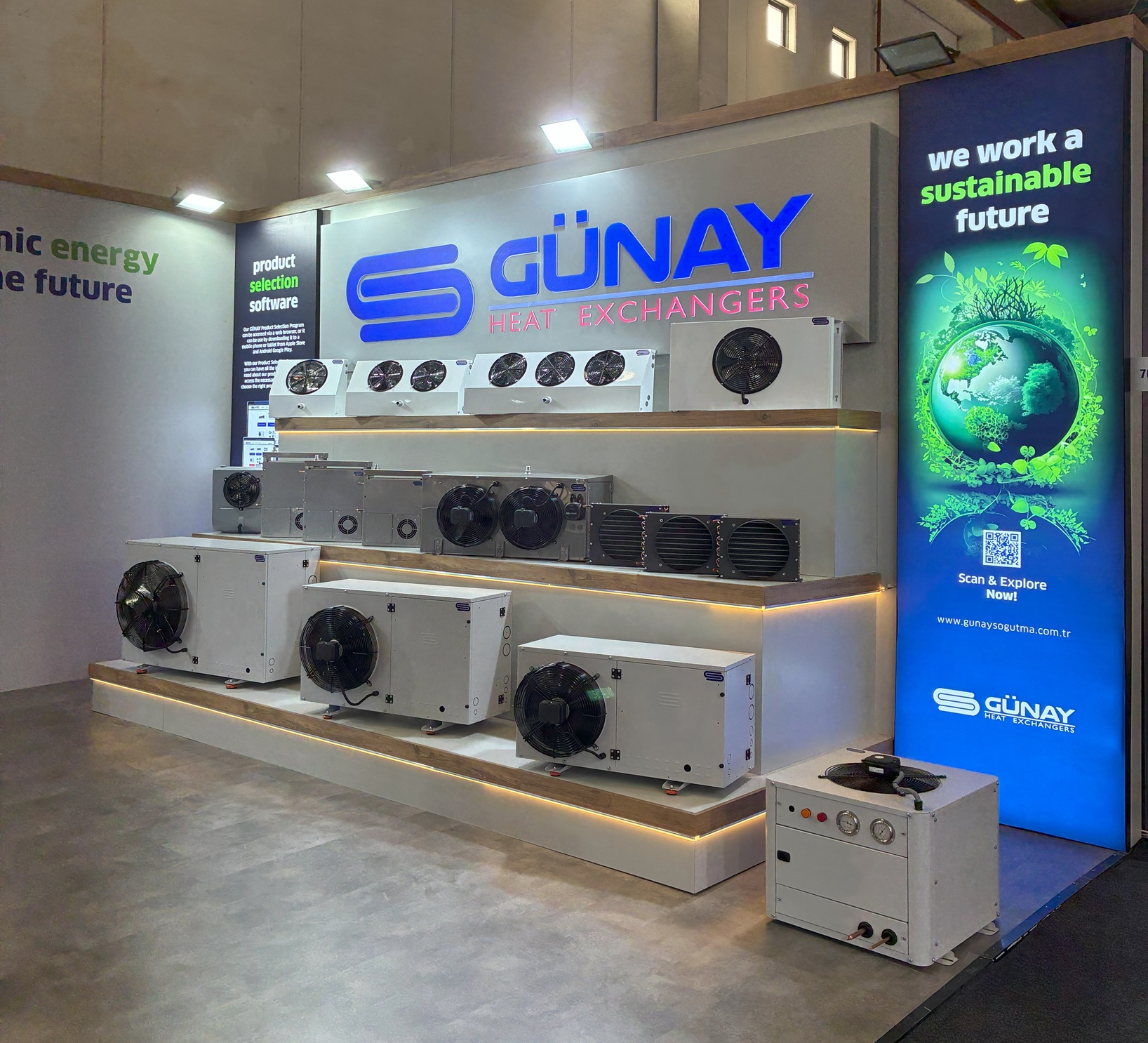
This year, Hostech by TUSİD 2025 was held on May 27–31 at the Istanbul TÜYAP Fair and Congress Center. As Turkey’s largest and Europe’s second largest HORECA fair, it welcomed approximately 35,000 visitors from 140 countries across a 45,000 m⊃2; exhibition area. Günay Soğutma proudly took part in this major event. At our booth, we showcased our innovative industrial cooling products and sustainable solutions, while also connecting with professionals from both Turkey and abroad. For us, Hostech was more than just a fair; it was a valuable opportunity to build new business partnerships, strengthen existing relationships, and represent our company more powerfully in the international market. The strong interest from foreign buyer delegations once again proved that we are on the right track. We sincerely thank all our visitors and look forward to meeting again at upcoming fairs.
Read More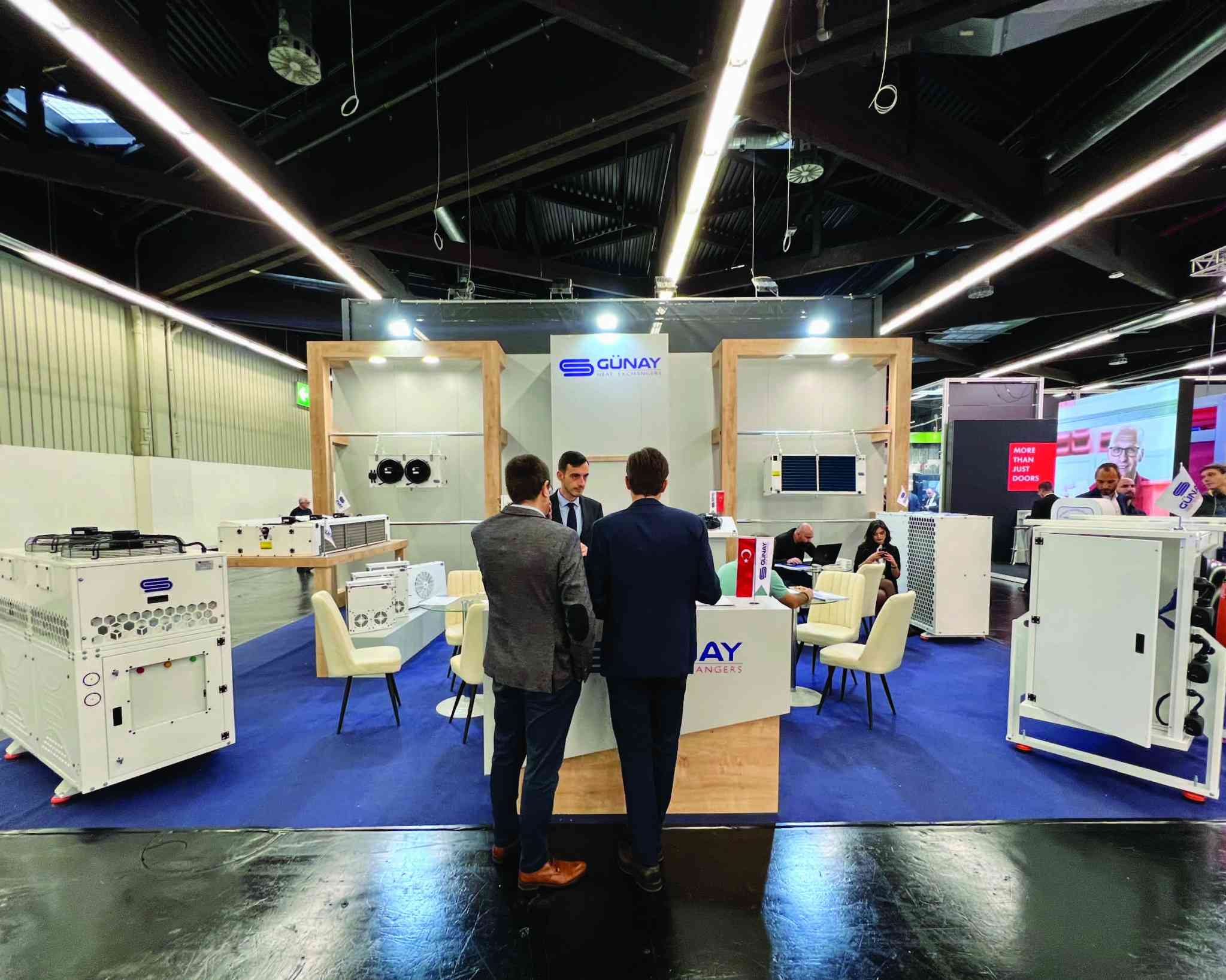
Thank You to Everyone Who Joined Us at Chillventa 2022! We would like to extend our heartfelt thanks to all participants and valued customers who visited our stand at Chillventa 2022. Your interest and the time you shared with us were a tremendous source of motivation, allowing us to present our innovative cooling solutions and share our vision within the industry. The connections we have built with you strengthen our leadership goals and inspire us to provide more efficient and sustainable solutions in the future. We look forward to building new projects and strong partnerships together!
Read More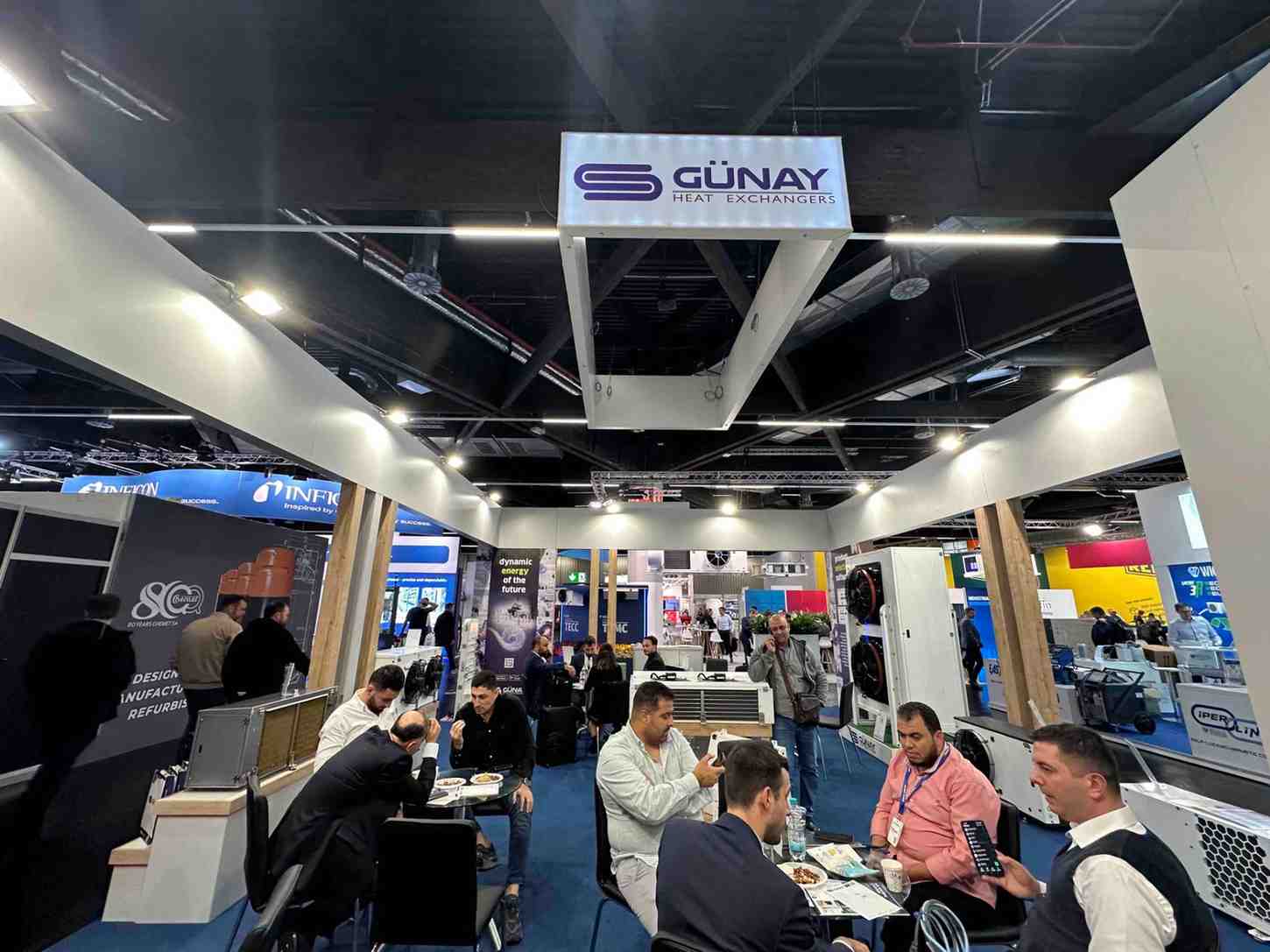
Günay Soğutma participated in the Chillventa 2024 Fair, seizing the opportunity to showcase the latest innovations in the sector. During the event, we shared our newest technologies and solutions in the field of cooling and air conditioning with attendees. The fair served as an important platform to connect with industry professionals and foster new collaborations. Visitors had the chance to explore our innovative products and sustainable solutions while gaining insight into our customer-oriented approach. Chillventa 2024 provided not only an opportunity for knowledge exchange but also a chance to keep up with the latest industry trends. We are pleased to have established new business connections and strengthened existing relationships through this experience. We would like to extend our gratitude to all the visitors who joined us at the fair. We eagerly look forward to meeting you again at future events!
Read More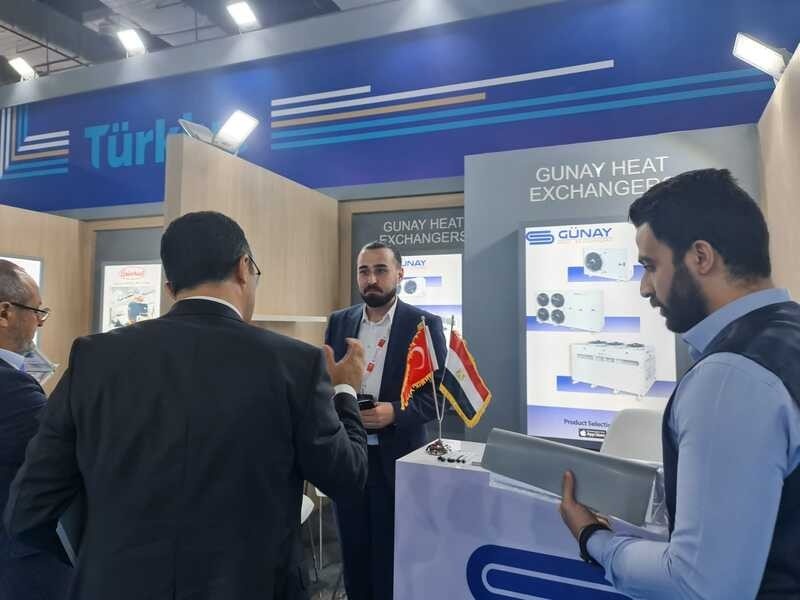
With the solutions we presented at HVAC-R EGYPT EXPO, we reinforced our reliability and sustainability principles in the refrigeration and heat transfer sector in Egypt.
Read More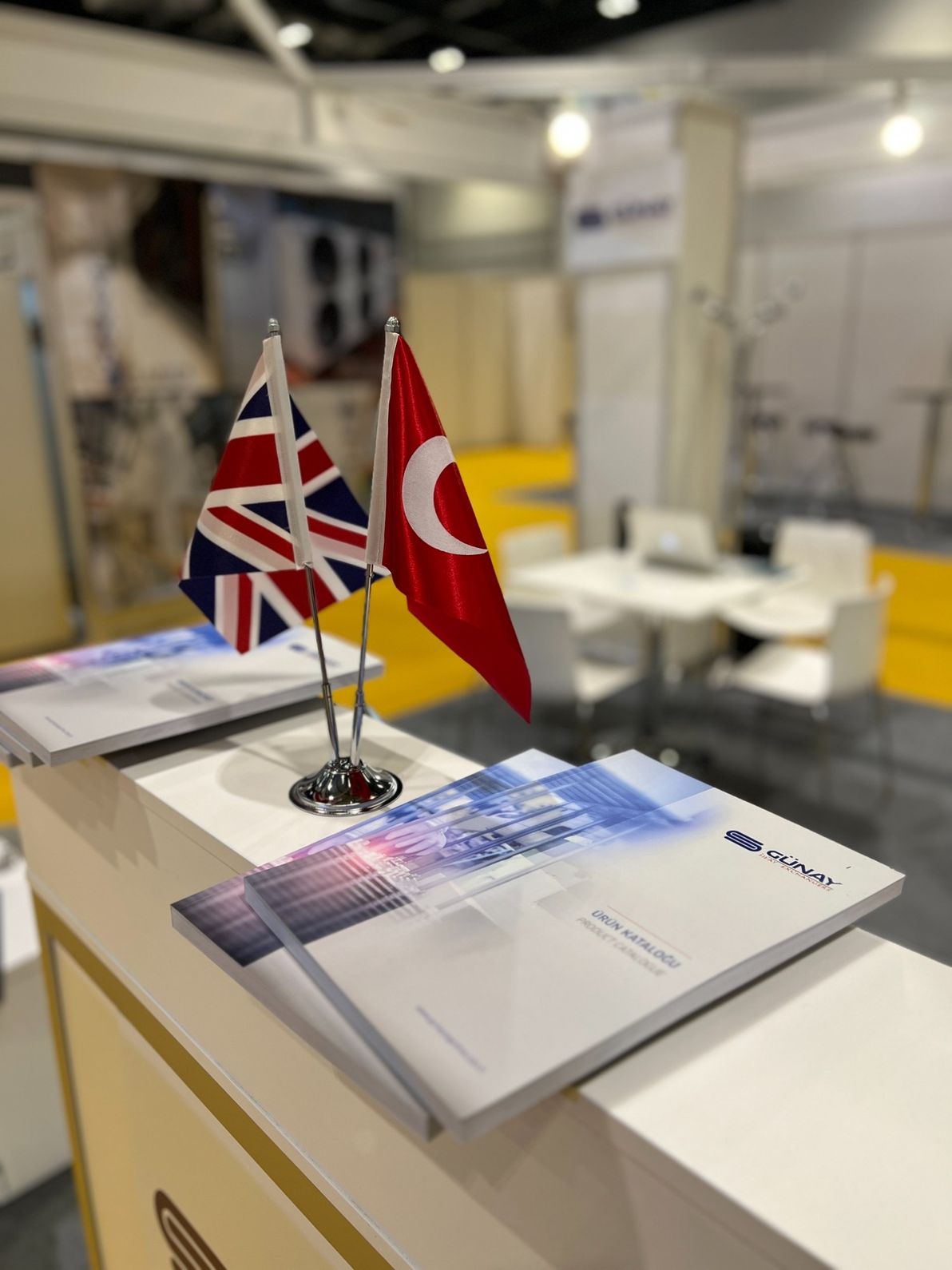
HVAC Refrigeration Live, as an important event in the industry, offered a very valuable experience for us. We would like to express our sincere thanks to all exhibitors and customers who visited our booth for their interest and time. The strong ties we have established with you give us great motivation to maintain our leadership in the industry and to carry our solution-oriented approach even further.
Read More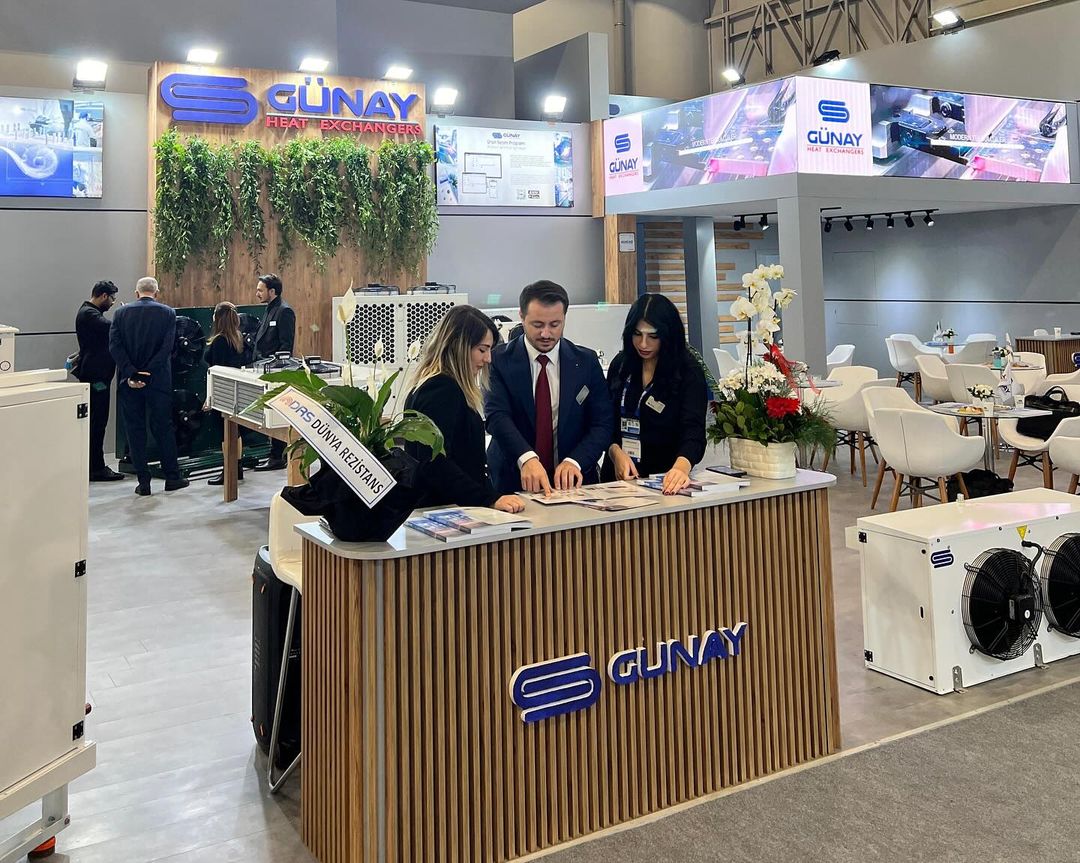
We participated in ISK-SODEX 2023, one of the leading exhibitions of the air conditioning industry. We would like to thank all our customers and exhibitors who showed great interest in our stand.
Read More
Thank you to all our customers and exhibitors who visited our booth at AquaTherm Exhibition 2023. Your intense interest made us very happy and we were proud to share our innovations in the sector.
Read More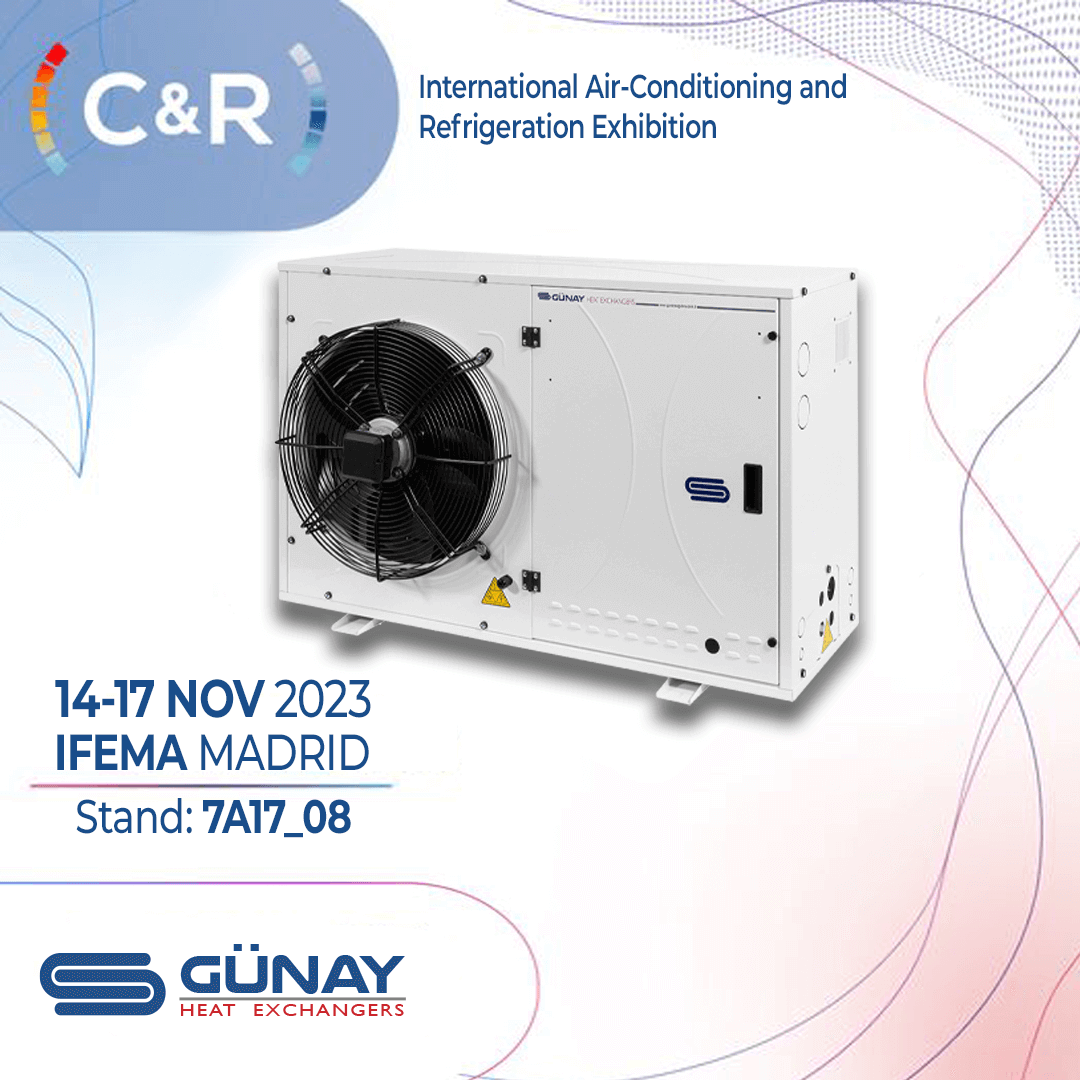
The C&R Madrid 2023 fair was an unforgettable experience for us as an important event in the industry. We extend our heartfelt thanks to all participants and customers who visited our stand for their interest and time. The connections we established with you inspire us to continue our leadership in the industry and strengthen our solution-oriented approach. We look forward to building a more efficient and sustainable future togethe
Read More
dynamic energy of the future

